
Hevruta Learning and Lifelong Skills 4
Honoring Shoshi Jalfin 24
SPRING/SummeR 2022 the magazine of schechter boston
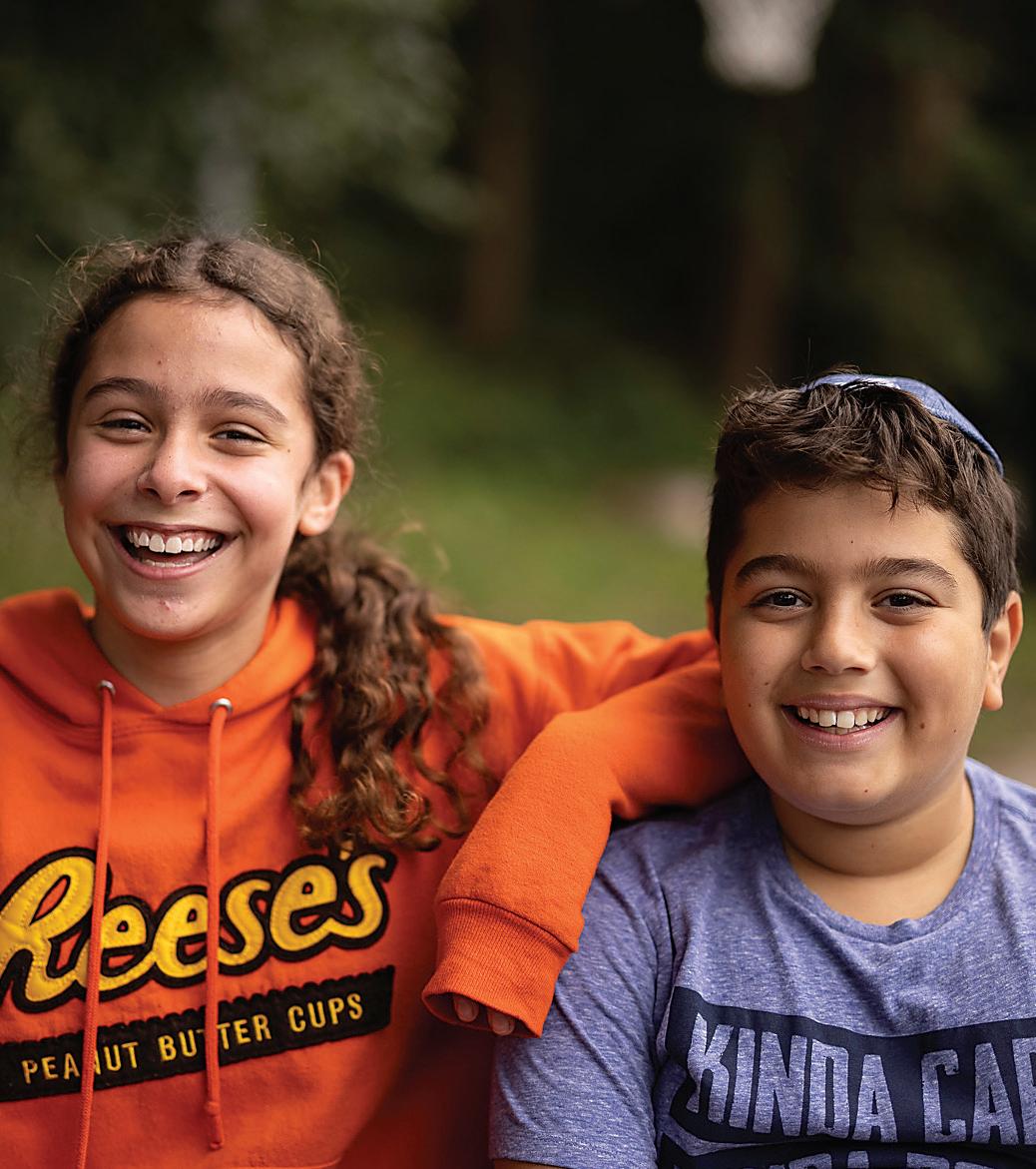
20–27
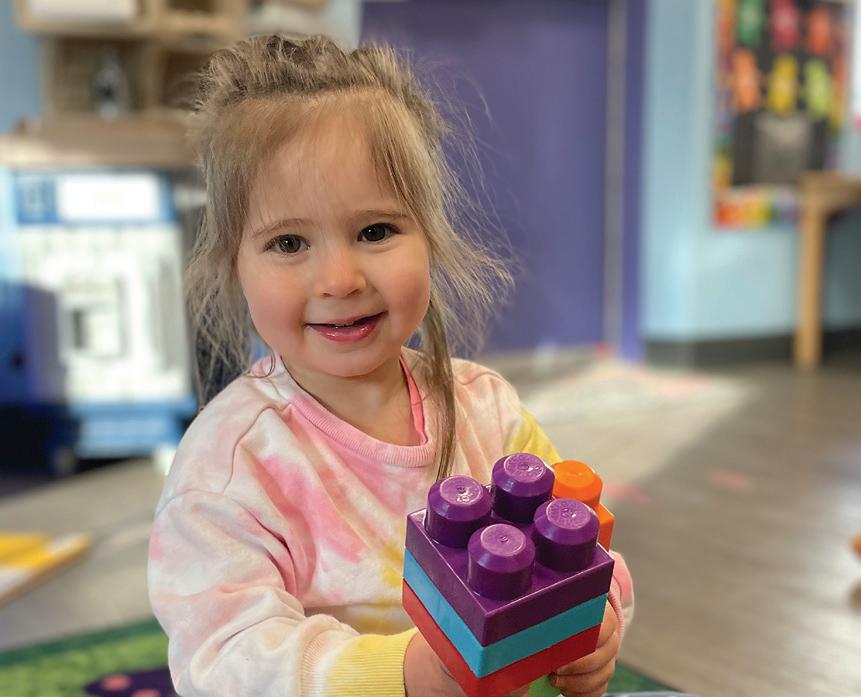
4–11
Hevruta Learning and Lifelong Skills
Editor and Writer
Rob Yunich
Photographers
Heidi Aaronson ’96, Tom Kates, Stephanie Fine Maroun, Maura Richards, Schechter Faculty and Staff, Jim Webber Photography and Rob Yunich
Design
Joel Sadagursky
Printing
Puritan Capital
We have made every effort to ensure that our stories were accurate at press time. Should you have any questions or concerns, please do not hesitate to email schechterstories@ssdsboston.org.
Please note that the mask policy this year has evolved with guidance from the Medical Advisory Committee. The pictures in this issue of Schechter Stories reflect both the mask mandate and the mask-optional policies that were enforced at certain points of the school year.
MA 02459
SPRING/SummeR 2022
Avenue Newton,
617-928-9100 | ssdsboston.org
Life at Schechter letter from rebecca lurie this is schechter
125 Wells
Table of Contents 1–3
Feature Developing Jewish habits of minD
Profiles maKing a Difference : Dan rosenzweig -ziff ’12 loving israel everY DaY: sara miriam liben ’05 preserving memories through Dance : rachel linsKY ’11 stuDYing metaphors anD the brain: Dr stephen J. flusberg ’96
Arnold Zar-Kessler Outstanding Alumni Award Dr. Jessica graY ’96
Notes
12–19 Alumni
28–32
Class
Snapshots Schechter Spirit GREASE! the all-hebrew musical honoring shoshi Jalfin isr ael comes alive

Shalom, friends!

As you read through this edition of Schechter Stories, you will be immersed, as always, in the life of our richly diverse community and the day-to-day activities of a school that is everchanging and growing.
As educators, parents and a community, we must always meet the moment. No one would contest that the current “moment” in which we find ourselves is complex, to say the least. Amidst the challenges we have endured and mastered during the two years of dealing with COVID, to the heartbreak and fury we feel at the atrocities levied upon Ukraine, we must educate our students—not only on an individual level, but also against the backdrop of the larger world. From the youngest student to the oldest, from our faculty and staff, to alumni and parents, we are passionate and engaged, always thinking and always working to be better, do
In these pages, you will find features about the hallways and classrooms at school that bustle with experiential Jewish learning and imaginative student programming. You will hear about the industriousness of our alumni. There are stories about the imagination and diligence of our teachers and the essential support of our volunteers.
This is just a taste of yet another incredible year in the life of our school. Enjoy the magazine and the summer ahead.
 Rebecca Lurie, Head of School
Rebecca Lurie, Head of School
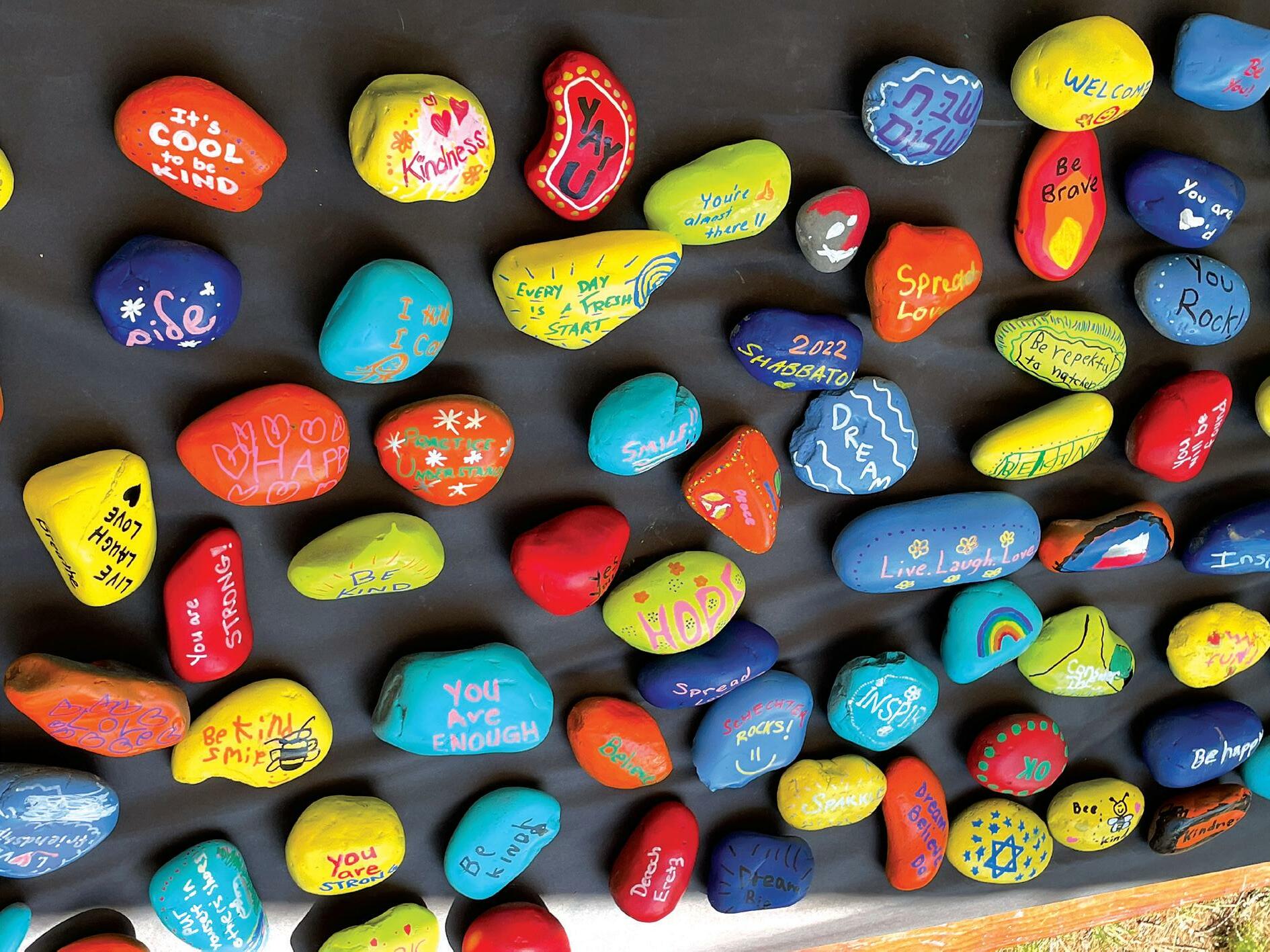
spring/summer 2022 | Schechter Stories 1
a lette R fRom Rebecca
This Is Schechter
6
$2,100
In coordination with a unit on tzedakah, seventh-grade students collectively made generous donations from their own Bar/Bat mitzvah gifts to a number of local and national organizations: the Dravet Syndrome Foundation, the Cerebral Palsy Foundation, the National Kidney Foundation, the Trevor Project, Oprah Winfrey Leadership Academy for Girls, JF&CS Family Table, World Wildlife Fund, Boston Children’s Hospital, the Greater Boston Food Bank and St. Jude Children’s Research Hospital. Students nominated organizations and discussed their allocations together.
Schechter alumni who are current parents.
Gan Shelanu classrooms were transformed into six different places in Israel in celebration of Yom HaAtzmaut, Israel’s Independence Day. Children traveled throughout each room to experience the “sights” and to learn more about Israeli food, music, dance, architecture, art…and of course, Hebrew!
7
Theater productions during the 2021-2022 school year: Aesop’s (Oh So Slightly) Updated Fables (Grades 2-3), Peter Pan (Grades 4-5), William Shakespeare’s The Tempest (Grades 6-7), Giraffes Don’t Dance (Kindergarten and Grade 1), The Golden Apple (Grades 2-3), The Brothers' Grimm: Cinderella (Grades 4-5) and Grease (Grade 8).
Students in Grades 1-3 participated in a collaborative project to create a large mural of influential women in history. They learned about 25 different women during the month of March, focusing on how each woman navigated obstacles and challenges to make a difference in the world. Given the timing and proximity to Purim, the third-grade students also discussed the women in the Purim story and how Esther and Vashti stood strong in their convictions.
$232.18
Funds raised for CJP’s Ukraine Emergency Fund during two weeks in March when 18 percent of all Spirit Store sales benefited this important cause.
2 Schechter Stories | spring/summer 2022
25 49
Middle Division Language Arts students received recognition in the National WordMaster Analogy Test Competition:
Grade 6
Sixth in the nation
Grade 7
Second in the nation
Grade 8
Ninth in the nation
Thirteen Schechter students received perfect 20/20 scores!
The Parent Association organized a series of Yom Chesed opportunities for students and their families. In one of these programs, for Grades 2 and 3, students created more than 100 bags of Mishloach Manot as well as birthday cards for Holocaust survivors, gift bags for our neighbors on Stein Circe and thank you packages for our local fire and police departments. The Mishloach Manot were distributed on Purim day by JF&CS to clients of Chai Residential.
We welcomed
54 Kindergarteners in 2021-2022.
Director of Jewish Life and Learning Rabbi Ravid Tilles and Grades 7-8 Science Teacher Dr. Tim Morris launched Maduah Madah, a podcast that explores the science behind aspects of Jewish Life. There have been many special guests throughout the year. For example, Jewish Studies Teacher Amy Newman joined the February 8 episode to discuss what it means to be human. They tackled the question of “What distinguishes us from other animal species and how does religion and science grapple with this existential question?”
Schechter alumni parents and current grandparents Jay Sage and Joni Schockett presented virtual workshops to alumni, alumni parents, grandparents, faculty and staff. The sessions were part of a year-long program on legacy-making. Jay shared an introduction to Jewish genealogy, and Joni facilitated a workshop on memoir writing.
We welcomed new students ages 15 months through Grade 8.
100
spring/summer 2022 | Schechter Stories 3

4 Schechter Stories | spring/summer 2022 featu R e

Developing Jewish Habits of Mind
By Stephanie Fine Maroun
At Schechter, we develop Jewish habits of mind in our students. This sounds like—and is—a worthy and unique way of thinking and working, but what does this mean exactly and why is it important?
The core concept of learning in hevruta (“partnership”) refers to partnership among two people and a Jewish text, each being an equal contributor. From classroom to classroom, one subject area to the next, Schechter teachers turn to and develop this method among their students. Students practice offering opinions in a meaningful way, listening openly even if they disagree, and remaining active thought partners by sharing and respecting others’ perspectives. We recognize hevruta learning as a dynamic paradigm that is broadly and beautifully applicable to virtually any academic discipline and, beyond that, to real-life situations.
Two seventh-graders wrestle with conflicting interpretations of a Jewish text in front of them. Two fourth-graders turn and talk to each other. They listen and respond with, “I hear what you are saying, ” or “I think I heard you say this…” or “Can you explain that differently?” Kindergartners puzzle through arranging brightly colored plastic blocks into mathematical patterns. Each of these scenes reflects hevruta partnerships and is deeply Jewish in approach. With the guidance of teachers and mutual support of classmates, students hone strong, portable interpersonal skills by learning to ask questions and leaving space for constructive dialogue.
One day, our alumni will turn to their own students or colleagues or teammates and say, “OK, folks, let’s break into hevruta now.” Can you imagine that? We can.
spring/summer 2022 | Schechter Stories 5
featu R e
The environment of a Jewish day school is uniquely positioned to support such sophisticated practices in the classroom.
In 2018, Schechter was one of four day schools nationwide chosen to participate in Pedagogy of Partnership (PoP), a groundbreaking two-year professional development fellowship through a grant from the AVI CHAI, Kohelet and Mayberg Foundations. Through PoP, participating faculty members received intense, comprehensive training designed to enable learners of all ages to develop the habits of wonder, empathy and responsibility toward others and toward Torah. Since that time, Schechter faculty members across all grades and disciplines, Jewish and secular, have incorporated these principles into their teaching and practice. Teachers cultivate concrete tools among students to improve their communication and interpretive skills. In fact, the environment of a Jewish day school is uniquely positioned to support such sophisticated practices in the classroom.
Interpersonal skills are an essential and powerful component of hevruta learning. Director of Jewish Life and Learning Rabbi Ravid Tilles shares that “hevruta learning is so important because it gives you the opportunity to hear other people’s perspectives that you may not have thought about. Sometimes students would prefer to
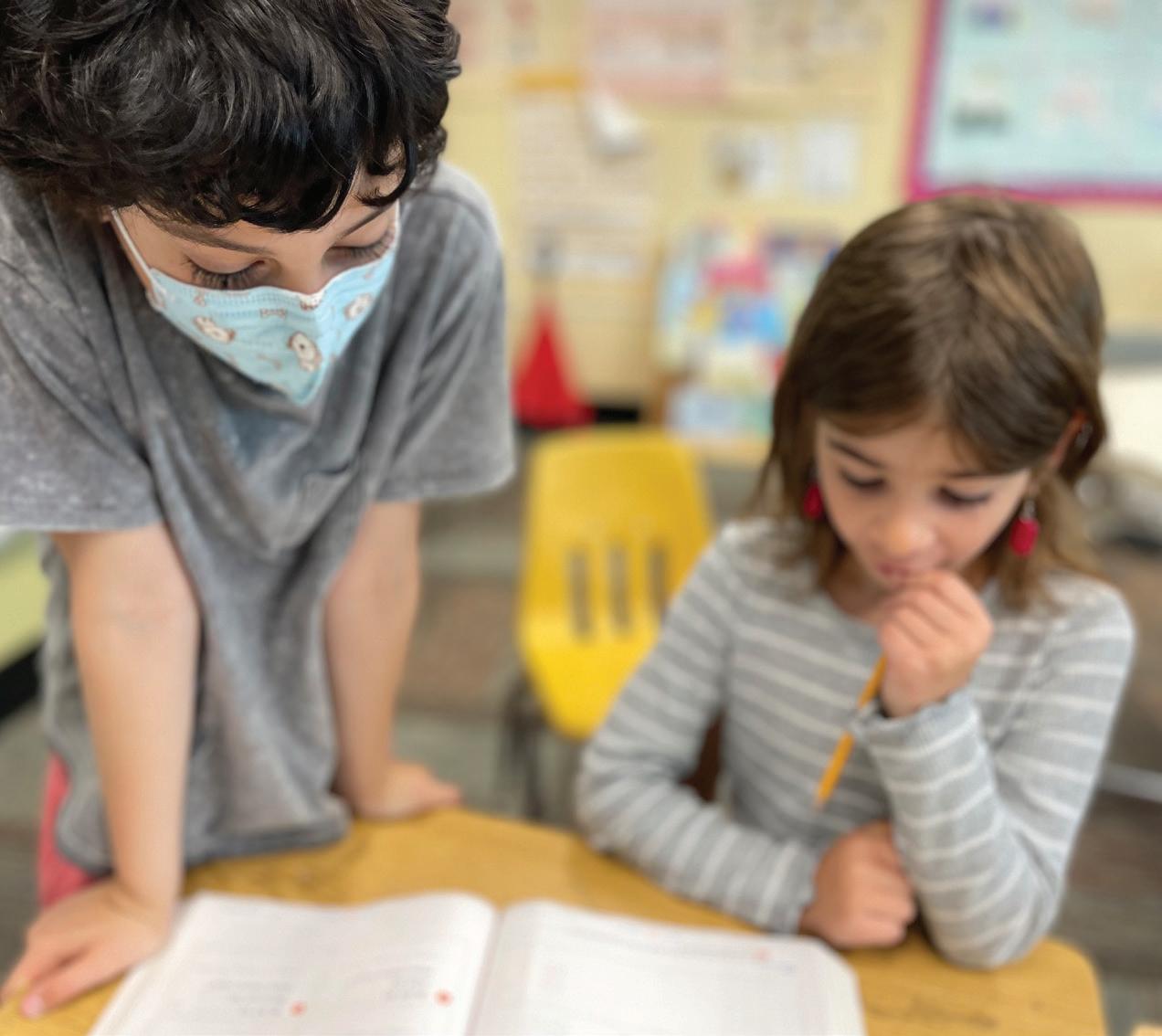
have their own thoughts and just have their voices be heard, but it can be very isolating to sit with your own thoughts only about an idea. Saying your perspective out loud to somebody else helps you articulate it. That’s when hevruta learning works best: students are asking questions of each other and saying, ‘Tell me more about that. What do you mean when you say that? Here’s another way that I could think about it.’”
Beginning in the fall, fourth-grade students in Jewish Studies plunge into the Book of Shemot, beginning with an extended unit on Perek Aleph, the first chapter. They tap into their experience in hevruta as they develop foundational skills for translating, engaging in textual analysis, and studying text with peers. Under the gentle, encouraging tutelage of Grades 4-5 Jewish Studies Teacher Lindsay Flammey ’07, students roll up their sleeves and persevere. “I tell my students that they might not always agree with their hevruta, and that’s a beautiful thing! It’s going to be hard and you might not always feel like the other person hears you, but that’s how we grow, by doing hard things. I frame it this way: this is a very Jewish thing to be doing, and it’s also a very hard thing to be doing, but that’s because it’s worth your while, and it’s going to help you grow. It’s a lifelong skill.”
Rabbi Tilles notes that hevruta learning forces participants to articulate their position in an effective way. “It’s not about changing perspectives, but about furthering and either strengthening a position or adopting a new position. At the very least, it teaches the important skill of listening. We hope that our students will be emphatic, compassionate and kind to one another. Creating and leaving space for other people to be their truest selves is a skill we want students to have inside and outside of the classroom if they are discussing a deep idea or just talking about what everybody did over the weekend. So, yes, hevruta helps students go deeper into textual ideas while strengthening interpersonal relationships and building community.”
Hevruta learning begins in the earliest grades. Grade 1 General Studies Teacher Michelle Prizand sits on the floor in a circle with her class as she explains a new nonfiction writing project. Students choose a subject they know well, such as football or dogs, beginning by counting off five facts on their fingers that they already know. Michelle encourages them to think about what questions their readers might have once they start writing. As she instructs the class to “turn and talk,” each student eagerly pivots and faces his or her partner. Purposeful, animated chatter
6 Schechter Stories | spring/summer 2022
featu R e
immediately fills the air in the classroom. “I match up the kids and they ask each other questions which prompts them to consider their topic more deeply.”
While this scene might not first appear to be what is commonly conceived as hevruta learning, it is highly intentional, not only for the purpose of training students to include detail and depth in their writing, but as one of the first carefully crafted iterations of hevruta learning at Schechter.
“We start with reading specifically at the beginning of the year,” Michelle explains. “What are three things we do when we’re reading? How do we find good learning spots? What is the type of spot where we are quiet and read to ourselves? After that, we work on partner reading, which is the start of group or hevruta work. How do we share our time, and how do we share our space as well? We practice these skills throughout the year in different scenarios working with each other. It could be worksheets, reading, projects. It translates into everything we do.”
Michelle notes that hevruta actually fosters independence. “Hevruta learning is about teaching students to apply the skills they already have and to be OK with making a mistake. That's when they learn from each other.” Michelle tells her students, “Ask three before me. I’ll correct and help in the end, but

if students are working with someone and they make a mistake, one of their peers can help them.”
Grade 8 Jewish Studies Teacher
Amy Newman relies on hevruta learning as a core way of structuring student learning. Walking into Amy’s class, which meets in the school’s library so that students can spread out, students sit in pairs around the room, huddled over the piece of text they are
The phrases “What do you notice?” and “What do you wonder?” are commonly heard in Schechter classrooms from the library to the lab. Earlier this year in science, sixthgraders were presented with a question from their teacher, Grade 6 Science Teacher and STEAM Team Lead Ferris Unni: do the type of rocks underground have an impact on the severity of earthquakes above ground? In order to develop hypotheses about earthquakes, classroom activities focused on why the surface of the earth is
I tell my students that they might not always agree with their hevruta and that’s a beautiful thing!
—Jewish s tudies teacher lindsay flammey ’07
learning. “Hevruta learning isn’t easy,” Amy says. “Diving into a rabbinic text requires grit, collaboration and persistence.” Amy explains that to support her students in learning how to unravel a Jewish text together, she created visual flow charts that show how the conversation should unfold. It begins by one partner slowly reading the text aloud in the original Hebrew or Aramaic. Students identify the words they already know and use dictionaries or translations to piece together the rest.
But learning in hevruta is not just about gaining text skills. Students in Amy’s class use the texts as a jumping off point to engage with the most important questions humans face. In one unit, students explore different Jewish perspectives on the question, “Why do bad things happen?” They study texts that focus on episodes in the life of Rabbi Akiva, who first tells his students that “everything that happens, happens for a good reason.” Ultimately, Rabbi Akiva dies as a martyr at the hands of the Romans, which challenges him to confront his belief in divine purpose. Students are left to make sense of real issues that do not have straightforward answers all while working in partnership with each other and with sources from the Jewish tradition.
dynamic. Science classes are structured so that students look at a phenomenon, the data that is derived from it, and then develop questions that will drive their curiosity to explain it.
Ferris shares that her goal is always to turn the learning over to the students. “At the core, we know—and research tells us—that students learn best in groups and from each other, in collegial environments. I focus on infusing agency and control into how students are learning, what they’re learning and where the work takes them next. They can only do that by talking to one another to make sense of what they see.”
Sixth-grade science work is investigative by nature and not bound to textbooks. Students are presented with small, complex texts rather than a list of facts or vocabulary to memorize. “They really have to dig their teeth into the texts,” Ferris explains. “Students spend three or four days engaging in some sort of investigation using online simulations, curated storyboards and student websites after which they make scientific points about what they saw, and then provide scientific evidence to support their claims.” Students assemble into pairs to create
spring/summer 2022 | Schechter Stories 7
featu R e
Instructions for Hevruta Learning:
Notice & Wonder Charts, graphic organizers or data tables to collect their information. “Depending on how meaty a topic is,” Ferris says, “we might break something up, then come back to make sure there are no holes in students’ research.”
Ferris explains “[t]exts have to be challenging, but how do you create learning experiences in which students look at texts, but the texts meet them where they are? I believe texts have to be dealt with more than one time. Students have to go back and look at them again through different lenses and different degrees of sophistication. I give them time to make whatever sense they can initially and independently before reevaluating the same text in pairs with a larger objective.
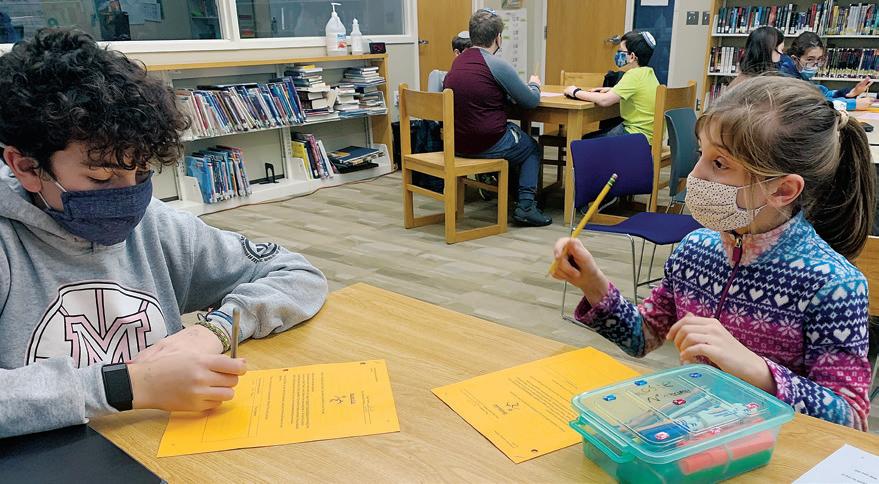
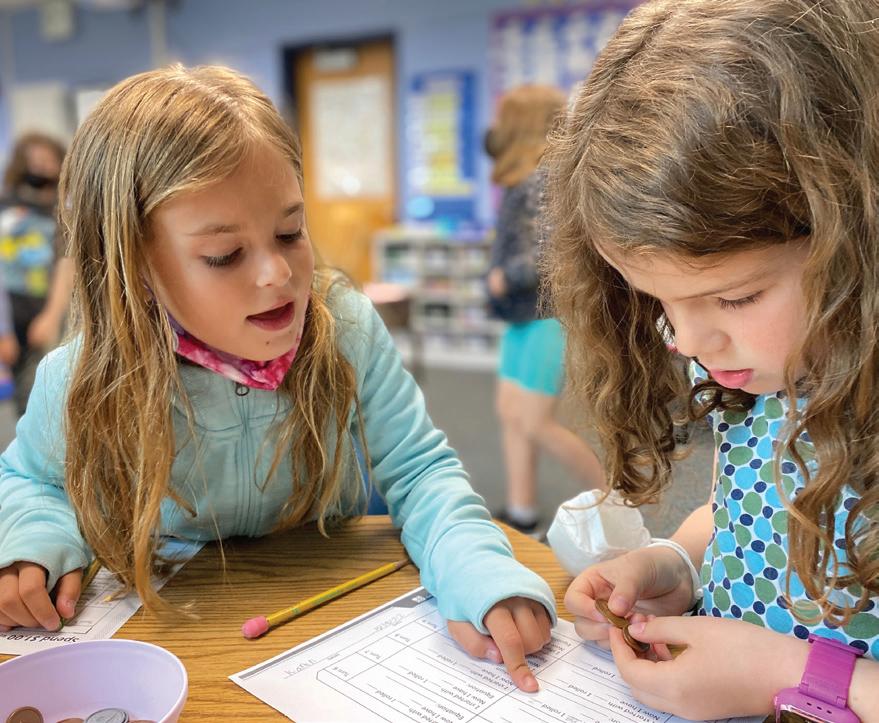
The singularly Jewish method of hevruta becomes a portable, go-to skill throughout a person’s life.
That way, they can learn from each other in conversation and see things they might have missed in their initial review. They then work as an entire class.”
Earthquakes, reading groups and the Book of Shemot certainly seem like odd bedfellows. These subjects, along with virtually any unit or lesson, however, are all the more accessible and nuanced for Schechter students because of their hevruta work. Beyond aiding comprehension and students’ ability to grasp the material itself, the value of instilling an appreciation for dialogue and a comfort with partnership, are equally critical dividends.
Director of Learning and Teaching Dr. Jonah Hassenfeld emphasizes that the singularly Jewish method of hevruta becomes a portable, go-to skill throughout a person’s life. “What does it actually mean to work with another person? Close reading and challenging yourself to go beyond a surface level meaning, including and beyond Jewish text study, is really a kind of intense literary criticism. We often don’t really read texts that carefully and, yet, in life, being able to read a text in a very close way becomes useful for everything from understanding a message you get on your phone to understanding a contract that you have to read, understanding the news that you encounter, or reading Jewish texts as an adult,” he says.
Student success is never a series of standalone buckets. Academic growth, social and emotional health, positive relationships with friends and with the larger school community are all the inextricable components of each student’s experience at Schechter. Nourishing and cultivating all of these measures of growth is a daily
goal that is again supported and well served by hevruta learning. Jonah suggests that “the kind of interaction with a text that we see in hevruta is a uniquely deep kind of engagement because it has to be active. Nobody is telling you what a text means. You’re figuring it out for yourself and you’re doing that with another person. So, it becomes this perfect way of hitting on all these different aspects of learning.”
Grade 2 General Studies Teacher Marisa
Keller explains that hevruta and group work “[t]each students how to cooperate with others and compromise. A lot of the time, kids will just want to do things the way they want to. I talk a lot about taking turns or letting each of them suggest their idea. Sometimes, they realize, ‘Oh! We have the same idea!’ They have to try to work together even if they all have different ideas,” she says. Marisa also notes the benefits of students’ figuring out how to combine their ideas. She explains to her class that “[i]f we go with one idea, how would we choose that one idea? I really stress that everyone is going to have his or her own way or strategy for doing something like in math, for instance, but it’s important to be able to learn from someone else’s approach.” Marisa roleplays for her class so that they can see good examples of give and take, and what it looks like when two people both want to share their way of solving a problem.
Jonah describes hevruta learning as hitting on the different kinds of skills and habits of mind we help our students form. “Hevruta provides this amazing training ground or laboratory for articulating your own ideas,
8 Schechter Stories | spring/summer 2022
featu R e
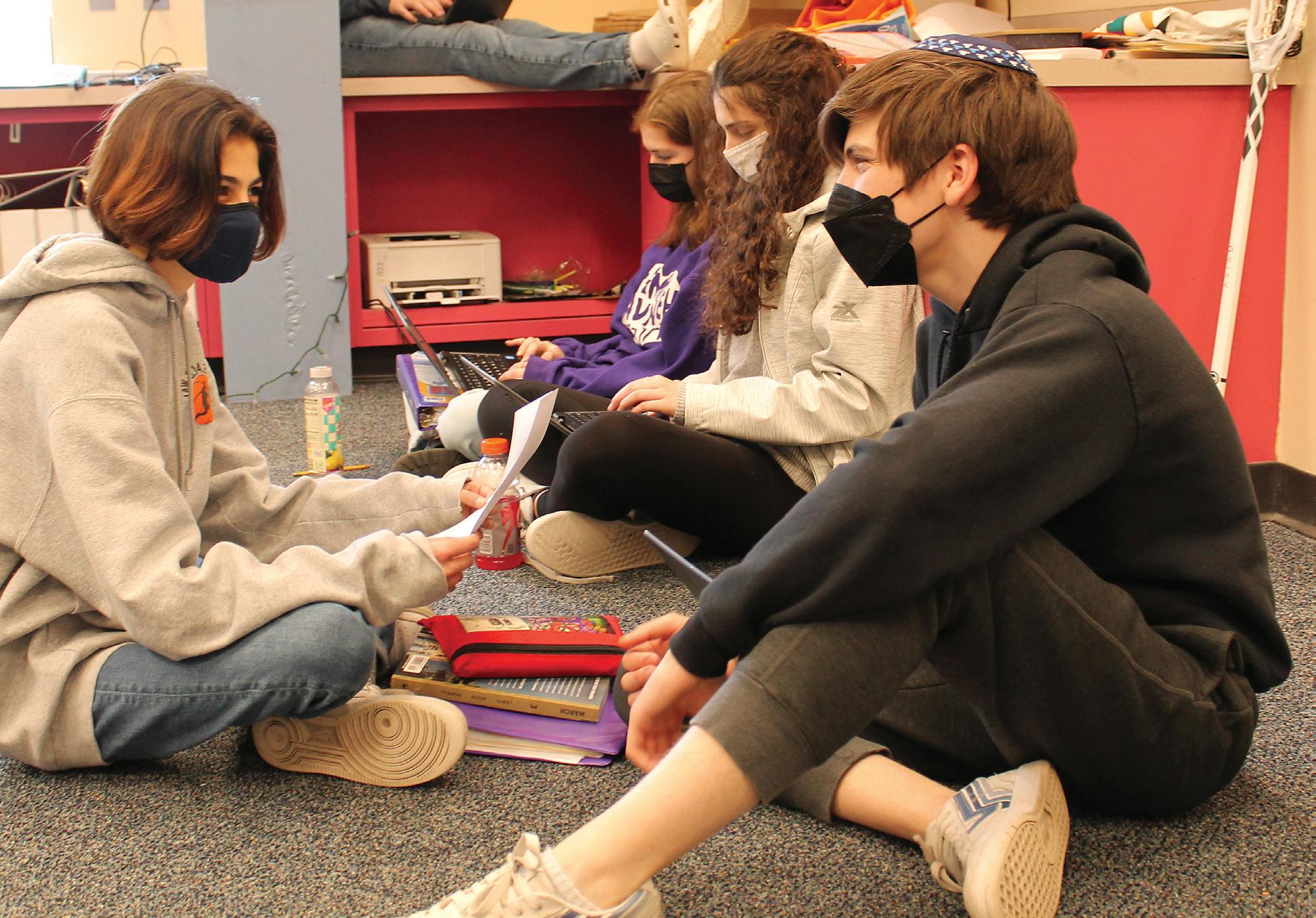
The kind of interaction with a text that we see in hevruta is a uniquely deep kind of engagement because it has to be active. Nobody is telling you what a text means.
—director of learning and teaching dr. Jonah hassenfeld
listening to another person’s idea and then also going back and forth to sharpen both ideas to make them as good as they can be. It includes learning how to relate to another person, so there’s an interpersonal, collaborative and social/emotional piece.”
If the end goal of hevruta is indeed more than just the immediate lesson, but also the synthesis of a variety of skills that will apply to almost any situation in life, students must find significance in their work. Lindsay explains that students wrestle with the big questions in the texts they are reading. “In the Passover story, which the kids know well, we think deeply about Moshe’s mother, Moshe’s sister and Bat Pharaoh. It’s important to make the text as relevant as possible.” Hevruta pairs debate and reflect
on the role and responsibility of a leader by examining these three women.
“We think about their actions and bravery. What should a leader do? Is the leader part of a community or separate from the community? What were these women feeling?” Lindsay posits. Ultimately, students designed an award for one of these women in honor of her courage. “The students have to be specific about which action they find brave, in which pasuk [verse] and why.
Each occasion when students come together represents another layer of practice and another opportunity to flex the mental muscles that lead to healthy cooperation and personal growth. All of this then is the ongoing formation and sustaining of Jewish
habits of mind. Schechter students are quick to respond when asked why they like hevruta learning. Over and over, students express feeling supported by their classmates or being proud to help someone else. They speak about the realization that there is more than one way to think about a topic or that listening to a partner’s ideas is often productive and eye-opening. Students recognize that the Jewish custom of hevruta is a special amalgam of Jewish study, respectful collaboration, problem solving and lively analysis.
Students might not realize, though, that these skills are theirs to keep and use, long after they graduate from Schechter.
spring/summer 2022 | Schechter Stories 9
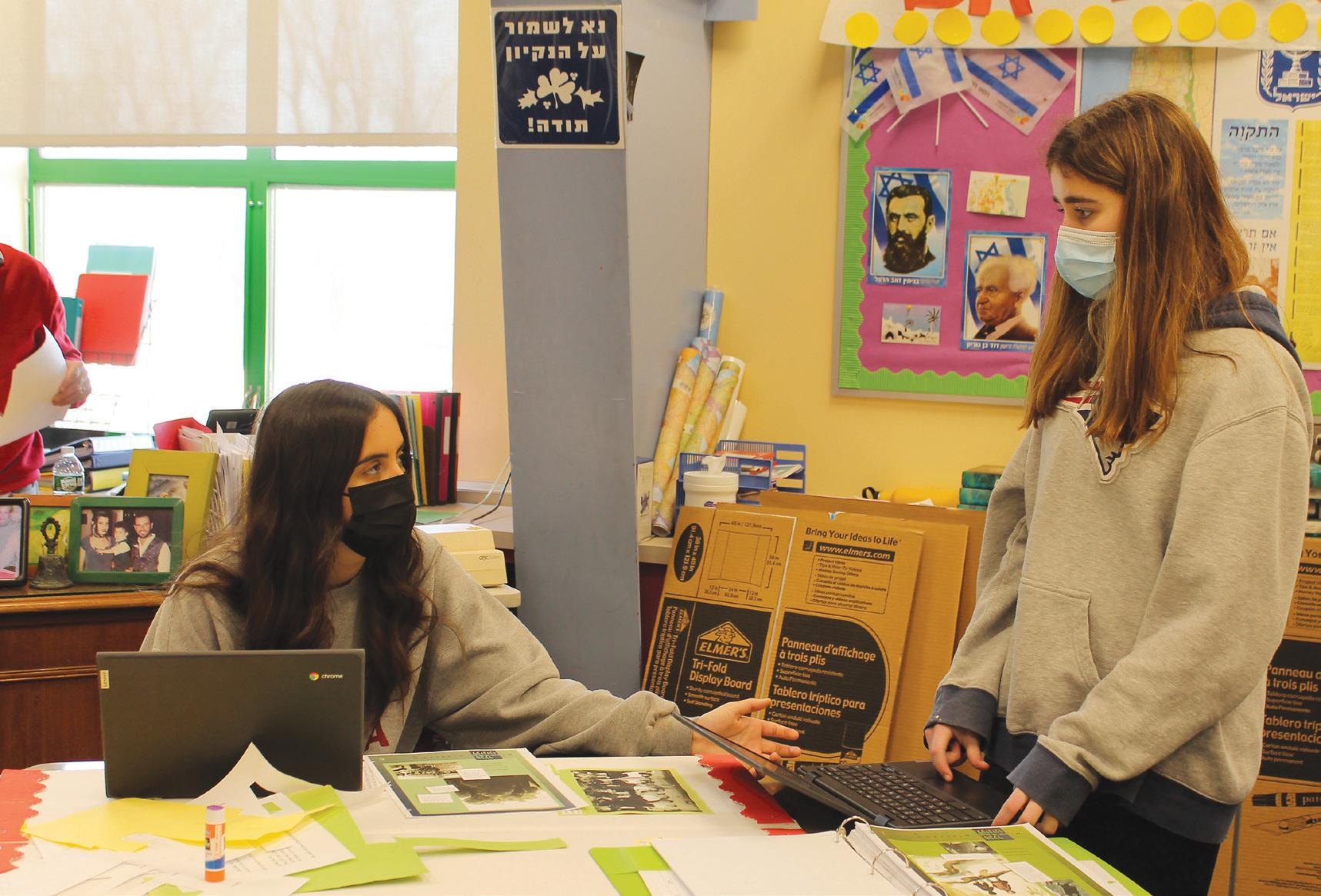
I like learning in hevruta because when you are confused you can always ask your partner and vice versa. It also helps you to learn to work with other people.
—l auren scheer, grade 6

I like hevruta learning because you can come up with a lot more ideas. You don’t feel lonely and your partner can build you up.
—alex m andell, grade 3

Learning in hevruta helps me understand the text in more depth because I can hear multiple interpretations of the text.
—m aya r achlin, grade 6
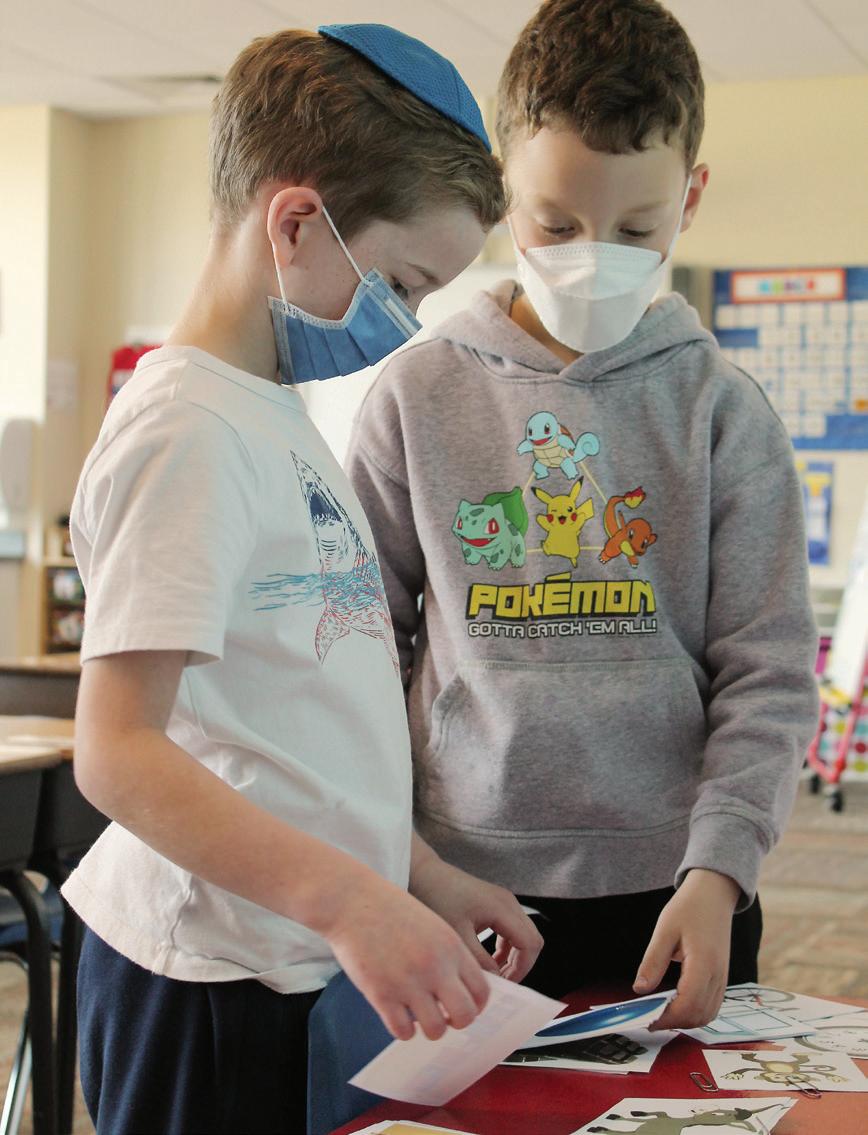
g/summer 2022
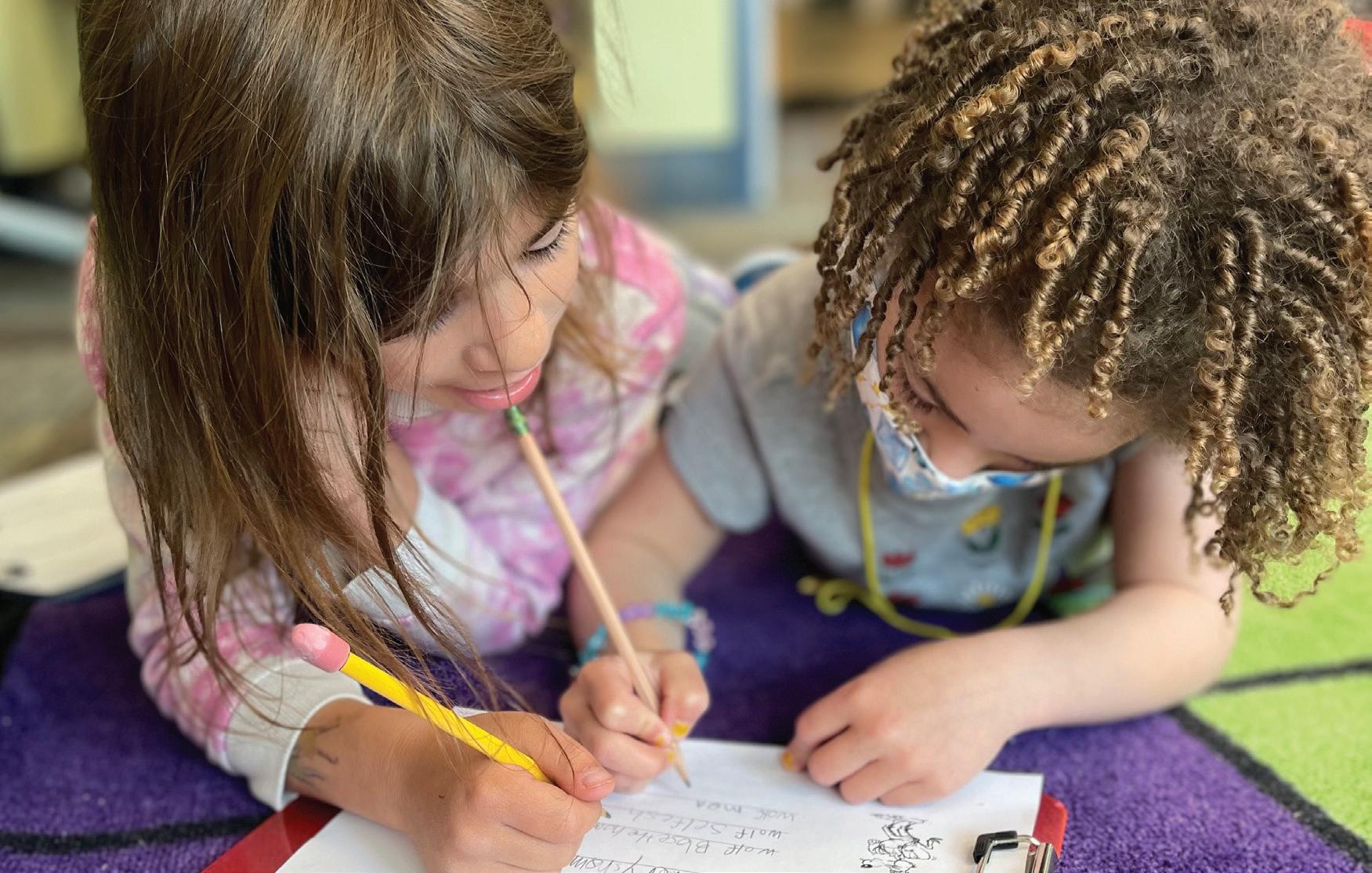

In a hevruta learning, you can work together and don’t have to rely just on yourself to come up with new ideas.
— charlotte a aronson, grade 3
It’s not good to leave someone out and being in a hevruta means that won’t happen. There’s always room for others to join you.
— Zev brodsky, kindergarten
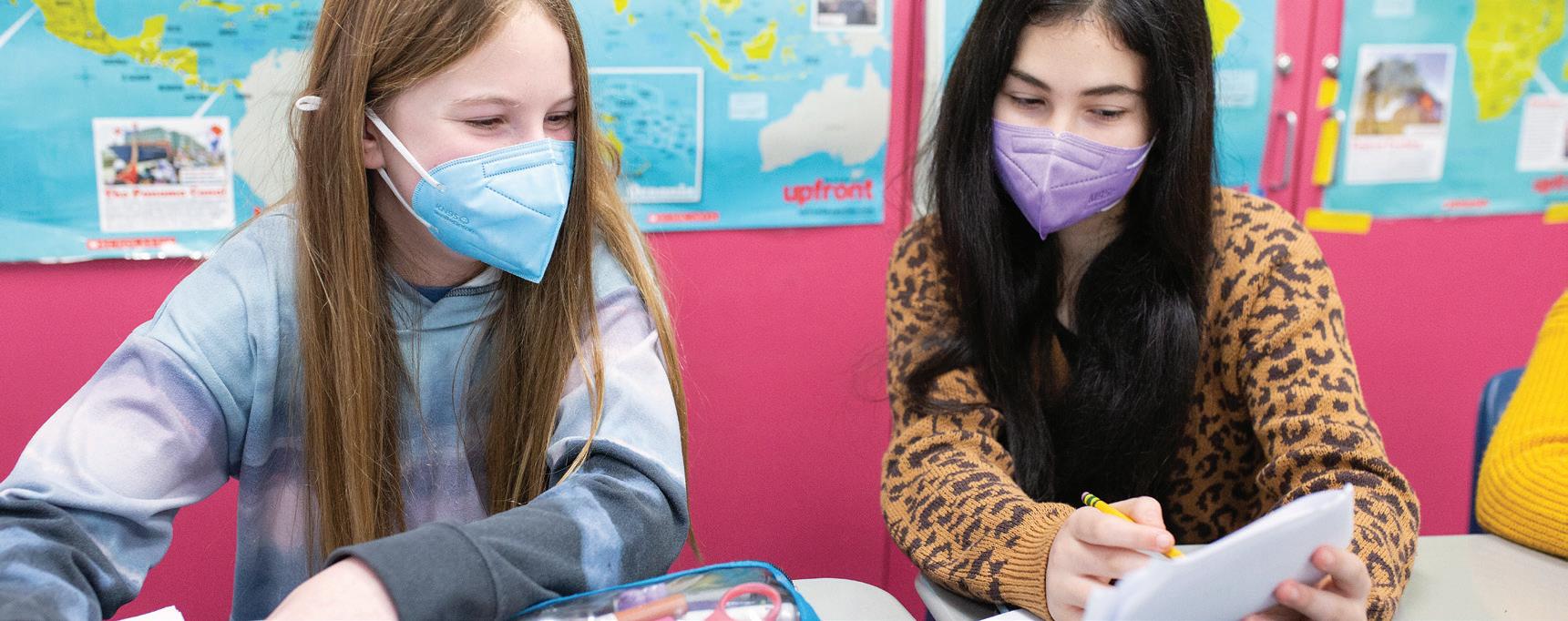
With my hevruta, I have more time to think deeply about my ideas and to express my opinion.

spring/summer
grade 8
l ancelot sokolic,
Making a Difference
a lumNI PRofIle:
Dan Rosenzweig-Ziff ’12
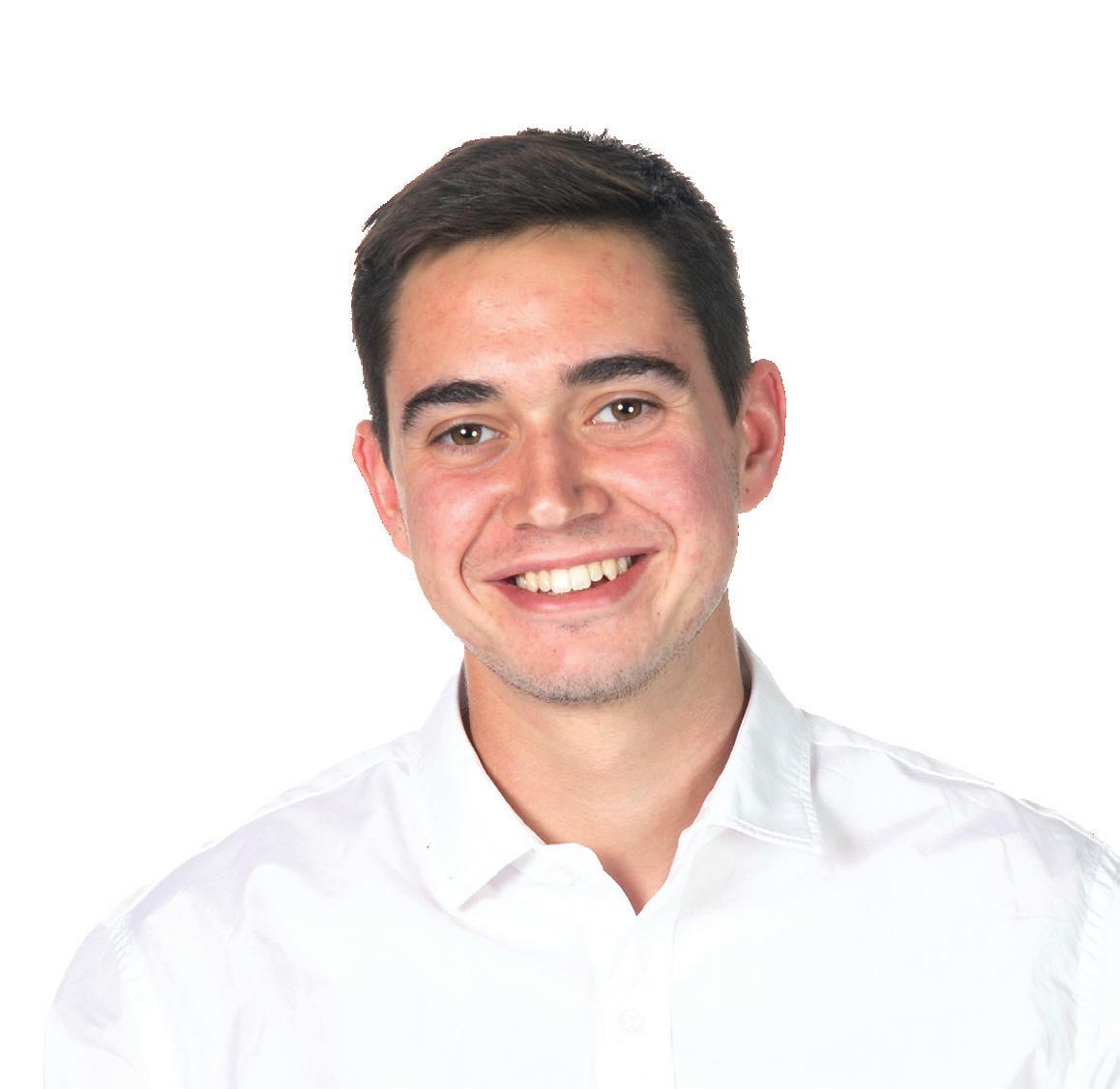
The lightbulb went off for Dan RosenzweigZiff ’12 during a gap year he took after high school. Already interested in journalism after his time at Newton South High School, Dan participated in Kivunim, a program focused on academic study, travel, exploration and growth that develops and deepens students’ Jewish identity as engaged global citizens.
It was during that year, based in Jerusalem, that Dan perfected his Hebrew and started learning Arabic. More importantly, he became deeply interested in international studies, which he was able to connect to his love of journalism.
“Kivunim really made me question and become interested in the stories that we tell and the stories that we hear about one another,” he says. “You and I can experience the same thing and have a completely different story about what happened. That drew my interest in the storytelling aspect of journalism.”
That experience at Kivunim carried over to Northwestern University, where Dan majored in journalism and international studies, deepened his knowledge of Arabic
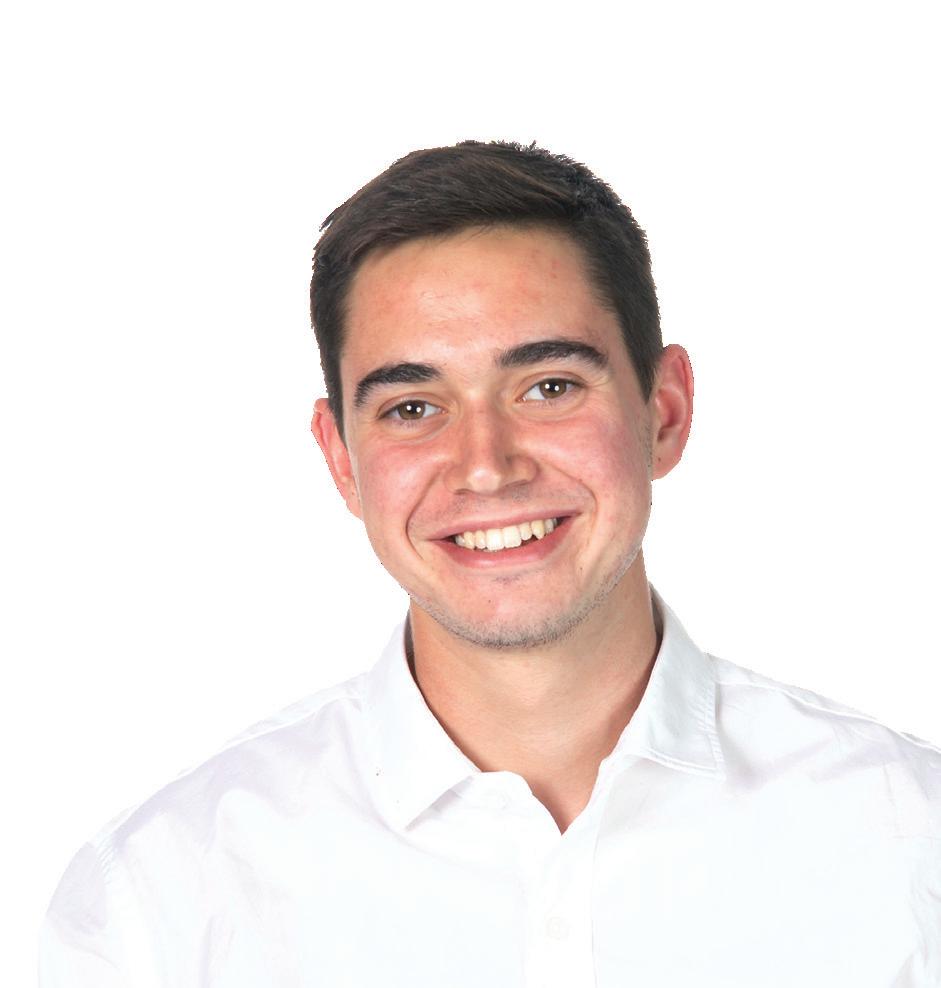

and studied in Jordan, living with a host family and taking classes entirely in Arabic. After graduating in spring 2021, he received a grant from the prestigious Fulbright U.S. Student Program. He is spending the year in Germany learning and writing about Syrian refugees.
“I’m interested in migration and the people specifically affected by it, the Middle East and journalism,” he says. “Germany has the most Syrian refugees in Europe. This program allows me to meld all my different interests.”
The Fulbright program allows for individuals to craft their own program. Dan is spending the year doing research and reporting on Syrian refugees and freelancing for several outlets. In 2015-2016, Dan says, hundreds of thousands of refugees came to Germany and the coverage was extensive. However, he noticed that there have not been as many stories lately, and he wanted to change that.
“That’s a lot of people who are making their lives here,” he notes. “A lot of things could go wrong and a lot of things could go right, and I just want to talk to them.”
12 Schechter Stories | spring/summer 2022
I want to understand from the refugees what their experiences have been like.
—Dan rosenzweig-ziff ’12
Dan’s main goal is to gain a greater understanding of Syrian refugees in Germany and to their experiences. He also is happy that he gets to utilize his knowledge of Arabic while learning German.
“Throughout college, jobs and my internships, I’ve enjoyed covering these complicated policy-governing programs that are in the news and making them more digestible through stories about people,” he says. “That’s what I’m trying to do here. Here’s this huge world event. There are all these programs, all this discussion, and there are only going to be more refugees every year. I want to understand from the refugees what their experiences have been like.”
There are no classes, so Dan’s program is completely self-paced. For example, every Wednesday, he visits a German language café at a refugee center.
“Going every week and hearing different people’s experiences, that’s proving way, way more valuable than taking classes,” Dan offers. “It’s been incredible talking to people and hearing the struggles they have, what it’s like to be here and just navigating the whole system.”
While he plans to return to the U.S. after his program ends, Dan hopes to be back overseas at some point to work as a foreign correspondent. Before then, his goal is to work in a newsroom and serve as a beat reporter.
Dan has Schechter to thank for his ability to handle the freedom that the Fulbright program affords him.
“Something you learn at Schechter is how to juggle all of these different things and switch your mind not only to different subjects, but also different languages throughout the day,” he says. “That’s definitely something that I do now.”
Dan started Schechter in Kindergarten. His older brother, Lev, graduated from Schechter in 2008, and his other brother, Max Kinchen, graduated in 2003. He especially appreciated the tight-knit group of friends that he gained from his time at the school.
“It’s rare for the rest of your life where you get a small group of people that you feel very comfortable with by the end of eighth-grade as I did,” he says.
Dan also feels that learning about refugees is something that’s important for Schechter students. This was the case in the fall, when students in Grades 6-8 participated in a Yom Iyun (ןויע םוי), a day of learning focused on refugees. The event began with a panel of speakers who have been involved with assisting refugee families in our community and also provided an opportunity for students to focus on the refugee experience in Social Studies, Jewish Studies and Havurah.
“It’s hard to imagine not being near any of your friends, not knowing any of the language, not knowing the culture, not knowing anything about the world you’re now living in. Even one person can make a difference." he says. “You can’t solve everything, but I think we have the ability to make a difference in people’s lives, and that doesn’t have to happen just on these days when you learn about the refugees of the world. There are people in Boston who could use help, and I think that if students are interested, they should seek that out.”
spring/summer 2022 | Schechter Stories 13
Loving Israel Every Day
a lumNI
PRofIle:
Sara Miriam Liben ’05
Sara Miriam Liben ’05 got hooked on Israel early in her life, and it quickly became apparent that making aliyah was her destiny. Sara Miriam had traveled to Israel numerous times, including on her eighth-grade trip with Schechter, by the time she reached college. But it took a moment near the beginning of her senior year, when she was studying in Israel, to make her move inevitable.
“I realized that I knew so much about the Israeli-Palestinian conflict, and I had never met a Palestinian,” she says. “I realized I knew everything about Israel, how to talk about Israel and how much I loved it, and I didn’t understand the complicated nature of running a country that doesn’t have separation of religion and state. To have such a robust education and to understand just how little I knew—I actually think this is one of the best and most humbling realizations that any young adult can have. ”
It was then that Sara Miriam knew she needed to return to Israel following her college graduation to ask more questions.
After graduating from Schechter, Sara Miriam headed first to the Maimonides School and then to the dual bachelor’s degree program with Columbia University and the Jewish Theological Seminary. Following her college graduation, she was on a fellowship in Israel when a war broke out. In the midst of rockets in Jerusalem and friends fighting in the Israel Defense Forces, she found that the interim space of being an “American in Israel” challenged the way her voice was being heard.
“That summer, my friends in America were like, ‘whether you’re right or left, you don’t really matter because you’re not Israeli.’ And my friends in Israel said, ‘you’re just here for a year and a half, what do you really know?’” she remembers. “And it was that summer that I said [to myself] I have a voice, I have a


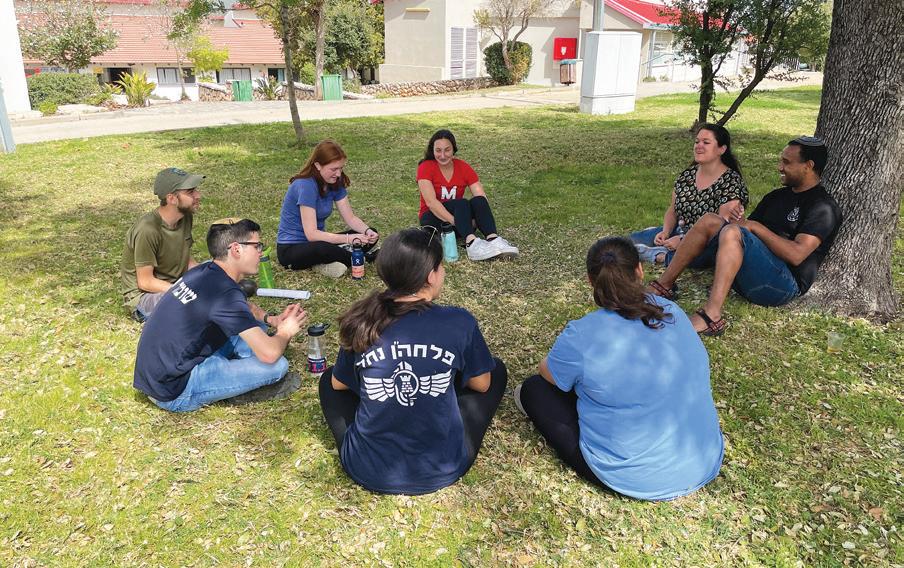
14 Schechter Stories | spring/summer 2022


I have a voice, I have a vision for what this country should look like. I want to be part of Israeli society to make an impact here.
sara miriam liben ’05
vision for what this country should look like. I want to be part of Israeli society to make an impact here.”
Sara Miriam currently serves as the director of the Nativ College Leadership gap year program, leading its day-to-day operations and managing a staff of six. Even the English meaning of Nativ fits Sara Miriam’s life: “path.”
“Every day brings questions of what it means to foster a vibrant Jewish-egalitarian community in Israel and how we have complex conversations about Israel, Jewish identity, and fostering personal growth with smart young adults. We’re talking about so many things like LGBTQ spaces, our relationships with Israel, how our politics affects our community and more,” she says. “My goal is not that the students make aliyah; my goal is that they go back to college campuses, and they’re able to speak about Israel and advocate for Israel because they had a transformative experience, met really diverse people here and really have a lot to say and give. Ultimately, they return to their Jewish communities with a strong relationship with Israel as well as an appetite to ask curious questions about the world around them.”
Nativ is split into two sections. The first semester focuses on academics, during which students can study in Ulpan at
Hebrew University, the Conservative Yeshiva or participate in a coding bootcamp. Participants spend the rest of the year volunteering in Israel’s periphery and participating in specialized seminars.
“The best thing we can do is give young adults an authentic experience here,” she says. “I’m working on our leadership development, I’m working on how we talk about Israel. I think everybody has a lot to learn about doing Israel education better and differently. I certainly don’t think that I know how to do Israel education perfectly, but it’s a huge zhut [honor] to be able to work with our young adults in this sphere.”
Sara Miriam’s ties to Schechter remain strong. Two of her two closest friends are from her Kindergarten class, David Offit and Talia Klein, and the trio gets together often. She also is the youngest of five siblings, all of whom graduated from the school: Micah ’95, Noah ’96, Talia ’98 and Jonah ’02.
Schechter not only launched Sara Miriam’s love of Israel, but also her life-long quest for knowledge.
“Don’t be afraid to ask questions. It’s not just that no question is a stupid question, it’s that only [in] asking questions do we begin to uncover things that we didn’t even realize that we didn’t know,” she says. “That’s huge, and if it can be instilled in every child, that’s a really, really big thing to leave with.”
Sara Miriam also appreciated the teachers at Schechter and their dedication to each student.
“Schechter never really gave up on any student,” she recalls. “It was always about you as an individual and how you can grow, which is an exemplary way to approach education.”
Sara Miriam currently lives in Tel Aviv with her husband, Adam, whom she married in March 2021. Her brother, Jonah, also lives in Tel Aviv.
“Don’t be afraid to let your children ask questions and answer them truthfully. I think we’re seeing that with all social issues these days,” she says. “I find that sometimes, especially with kids, we pretend that some of the challenges aren’t there because of Ahavat Yisrael [love of Israel]. Ahavat Yisrael—for the country and Jewish peoplehood—is a big part of my identity. Instead of shying away from challenges, I believe we should be confronting them with love and curiosity. Ultimately, I believe it will strengthen our relationship with Israel. Just like anything else going on in the world, it’s really important that we care about a country from a place of love, curiosity and knowledge.”
spring/summer 2022 | Schechter Stories 15
nativers visiting with sara miriam in her tel aviv office nativers at a concert in israel a nativ session on diversity in the idf t
Rachel Linsky ’11 has carved a unique path: conveying the stories of the Holocaust through dance, combining her two passions.
“From my time at Schechter, Holocaust education was one of the most resonant things taught because it was taught through both history and stories,” she says. “And it’s the individual stories that really stay with you. When you have the breadth of material, and when you hear stories directly from Holocaust survivors, it resonates.”
Rachel started dancing in Schechter’s afterschool program, learning hip-hop as a fourth-grader in a class taught by Erica Sperberg of The Dance Academy of Siagel Productions. Her nascent dancing career picked up steam before eventually landing her at Elon University, where she earned a B.F.A. in dance performance and choreography and a B.A. in arts administration. It was at Elon that her passion for dance and Holocaust education melded even further.

“In college, as I began to choreograph, I found meaningful inspiration in the symbols, movements and songs I learned growing up,” she says. “I use dance as a means to tell stories. My family, Judaism and that strong sense of community are a significant part of who I am and the stories I tell.”
Elon, a town of about 11,000 located about 20 miles from the bigger city of Greensboro, North Carolina, has a very small Jewish population. Rachel took this setting as a way to help increase her peers’ awareness.
“For a lot of people, I was the first Jewish person that they met, which was a very striking difference from the Boston Jewish community,” she recalls. “At one point, I realized that my peers did not have the same experience with Holocaust education as I had, and they didn’t necessarily have that inherent respect for these stories and pieces of Holocaust literature.”
Preserving Memories Through Dance
With her mission established, Rachel created a dance piece set to a poem by survivor Rachel
Alexander Kimmel, with three of her peers participating as dancers.
“I was able to bring my non-Jewish friends into the Hillel Yom HaShoah programming. They were curious to see the dance piece I was working on, and to see their other friends in the dance program,” she says. “In that moment, I realized that this could be an interesting means to bring Holocaust education in a non-religious setting to a more diverse group of people.”
This crystallization set the direction for Rachel’s career. Her first post-graduation piece, entitled “Do I Want to Remember?,” was accepted into the Boston Contemporary Dance Festival. She was able to hire Bostonbased dancers with a grant from Combined Jewish Philanthropies of Greater Boston.
Linsky ’11
alumNI PRofIle :
Rachel’s Holocaust-inspired dances, under the umbrella of “ZACHOR” (remember), are a collection of works focusing on different survivors’ stories and words. Her next stop would have been a residency at Chelsea Theater Works in 2020. However, like many others, the pandemic forced a change of plans. While she still found a way to create, it unfolded much differently than originally imagined.
“The pause that the pandemic created for the arts world, and the shift to Zoom, enabled me to take a lot more time to talk with my dancers about why I believe that Holocaust education is so important and relevant today,” she says. “Amidst the pre-pandemic hustle and bustle of the arts world, there wasn’t always that time to pause and just talk. That discussion time ended up being really important.”
Rachel ultimately collaborated with Olivia Moon Photography/halfasianlens to create a dance film titled “Selection” that premiered in September 2020. It was recorded at the New England Holocaust Memorial.
“In that film, I could see very clearly how all that time on Zoom paid off. While we couldn’t move as expansively as we would have liked to, since we were limited by the space in our respective apartments, we did get to talk about the intention behind each movement and gesture I was creating,” Rachel says. “It was very clear that it led to stronger performance quality and stronger storytelling from the dancers. The dancers were more passionate about what they were
doing. They were able to articulate and share that with their own communities.”
The blueprint had been set. For her next dance film, “Hidden,” the dancers who worked with Rachel read the story of Aaron Elster, a Holocaust survivor hidden for two years as a young boy in a Polish family’s attic. During and after reading the book, I Still See Her Haunting Eyes: The Holocaust and a Hidden Child Named Aaron, dancers responded to Rachel’s discussion prompts and selected memories that most resonated with them. This all happened before any dancing even began.
“I wanted to create a more collaborative creative process that could lead the way to an embodied Holocaust educational experience for the dancers involved in the work. In turn, I hoped that would create even clearer storytelling for the audience members,” Rachel says. “It was clear that the audience was able to not only recognize the story that was being told, but they understood the importance of studying histories like the Holocaust in this embodied and resonant way.”
“This new approach is especially important as we think about what happens when there are no longer any living survivors to tell their stories,” she adds. “How do we keep passing them down? And how do we keep hearing their stories and hearing the lessons they have for us while actively working toward their goal of preventing history from repeating itself?”
Rachel is currently developing “Hidden” into an evening-length work, which will be performed live in October 2022 at the Boston
Center for the Arts. She also will be leading her first-ever embodied Holocaust education workshop series with teenage dancers, who will be incorporated into the performance. She is eager to share her creative process with these students and to learn from their perspectives and why they believe it is important to keep these histories alive today.
“With ZACHOR, I hope to keep creating works to honor a variety of testimonies; there are so many stories that are each so important to hear,” she says. “And it’s critical to me that, as a community, we take time to reflect on how survivors’ lessons for us are relevant to our lives today, and the many injustices happening around our country.”
Without those early lessons from Schechter, Rachel’s passion for Holocaust education might not have become so fervent.
“For me to have grown up constantly hearing stories—having Holocaust survivors come in and speak to us at school—is a very special thing that should be cherished,” she says. “For the generation after me, the opportunity to hear those stories first-hand is dwindling.”
Rachel now sits in the teacher’s shoes and understands that the direction she’s chosen is not an easy one, but ultimately, is crucial.
“To create work and open up conversations on these topics involves a lot of responsibility, a lot of research and a lot of weight,” she reflects. “But this work is deeply meaningful, and I do believe that it can enact reflection and change.”
You can read more about Rachel and see examples of her work at rachellinsky.com/zachor.

It’s critical we take time to reflect on how survivors’ lessons for us are relevant to our lives today.
—rachel linsky ’11
Studying Metaphors and the Brain
Dr. Stephen J. Flusberg ’96
Unlike many people, Dr. Stephen J. Flusberg ’96 decided at the tender age of 18 what he wanted to do with the rest of his life. As a college freshman, he took a psychology course and immediately fell in love with the field.
“I never realized that you could scientifically study the human mind or human behavior. I just didn’t understand that was a thing,” he says. “I had a lot of misconceptions about what psychology was, that it was all clinical, that it was all treating mental health problems and that it was very intuitive and subjective.”
Stephen went on to major in psychology and religion at Northwestern University and, after graduating, worked at Harvard Medical School as a psychology research assistant. He eventually earned a master’s degree in psychology from Stanford University and a Ph.D. in cognitive psychology, also from Stanford.
Cognitive psychology, as Stephen describes it, is the area of psychology in which the mechanics of the brain are studied.
“Trying to understand the principles that enable cognitive functioning and mental life—perception, memory, learning,
attention, language—those are the major subdisciplines of cognitive psychology,” he says. “I’ve been involved in each of those.”
Stephen currently holds three roles at Purchase College: chair of the psychology department, faculty director of pedagogy development and associate professor of psychology. His goal at Purchase has been to find a balance between research and teaching. In his current role, he also helps with managing colleagues, liaising with the administration, hiring adjunct faculty and handling student issues for the largest department on campus. Despite all the tugs on his time, Stephen never loses sight of what made him fall in love with psychology in the first place.
His focus now is exploring the “relationship between language and cognition—the language we speak and the language we’re immersed in and how we think about the world,” he says. This plays out in the area of metaphors.
“I’m studying how metaphors in language reflect and shape people’s thoughts and attitudes and behaviors and trying to understand how that works,” he says. “There was this idea that if you look at pretty much every language in the world, metaphors are part of the language.”
While metaphors have been the subject of scholarship since the time of Aristotle, “it’s only in the last maybe 20-30 years that cognitive psychologists have tried actually to experimentally test [metaphors],” Stephen explains. “We look at how metaphors shape people’s attitudes and thoughts.”
Stephen’s current research focuses on war metaphors, specifically surrounding COVID. In fact, his theory paper for 2018, “War Metaphors in Public Discourse,” has gained new life because of the pandemic, leading to multiple interview requests by the national media. For example, Stephen states that Donald Trump called himself the “wartime president,” and he referred to the doctors and nurses as being on the “front line.”
“The use of the war metaphor at first was good because it got people engaged, and then it should have been dropped almost immediately because it’s not a great metaphor,” Stephen says. “If you say, ‘we’re at war now, stay at home and do nothing,’ those don’t jive, and it doesn’t match the metaphor.”
He plans to follow up with papers on disease metaphors, and metaphors around climate change and sustainability. In fact, Stephen’s current career examining words is a direct extension of the Jewish Studies classes he took at Schechter.
18 Schechter Stories | spring/summer 2022
lumNI PRofIle:
a

[At Schechter] we were analyzing the Torah, we were analyzing the Talmud, seeing how people argued over single words and what they meant in different contexts. That is a core piece of my scholarship—to analyze and be willing to argue about text and to view that to be part of science.
—Dr. stephen J. flusberg ’96
“We were analyzing the Torah, we were analyzing the Talmud, we were seeing how people argued over single words and what they meant in different contexts,” he says. “You wake up 30 years later, and that’s one of the things I do in my scholarship. That is a core piece of my scholarship, which is to analyze and be willing to argue about text and to view that to be part of science.”
“I think there’s a scientific lesson here too, though, which is that you can arrive at a deeper understanding of something through deep analysis and argumentation,” he continues. “That’s what science is ultimately as well. That lesson, for me as a scientist and a scientist who studies language, is deeply rooted in my early experiences at Schechter.”
Stephen’s connection to Judaism—and the ability to personalize that experience—also started at Schechter.
“My appreciation for Judaism and the varieties of Judaism, both that I’ve practiced and that I’ve seen among students at Schechter, is just that you can create your own meaning and your own rituals within a tradition,” he says. “That’s been really important in my life.”
“The ability to find grounded meaning and not feel like it has to match what everyone else is doing, that there’s space and room for difference and for individuality, even within a broader, religious community is my vision of Judaism,” he adds.
“At least that’s my vision of Judaism that I’ve cultivated.” Stephen’s dedication to academia also started at Schechter.
“When I got to high school, and I was around a lot of different people, I didn’t realize that I read books for fun, and that’s what I did all the time. I didn’t really want to go to a party,” he says. “Academia has become part of my identity and my life, and that was certainly supported and nurtured at Schechter.”
Stephen also implored today’s students not to take their Schechter education for granted.
“There’s an incredible education that’s being provided and a supportive environment for learning. You’re learning a lot more than you think,” he says.
spring/summer 2022 | Schechter Stories 19
Snapshots
A New Virtual World
As in-person events slowly returned throughout the year, Schechter continued to provide virtual opportunities for families, so they could witness the many events happening at the school. Through Zoom, events such as Shabbat Shira, plays, musical performances and even the megillah reading could be watched from anywhere in the world.
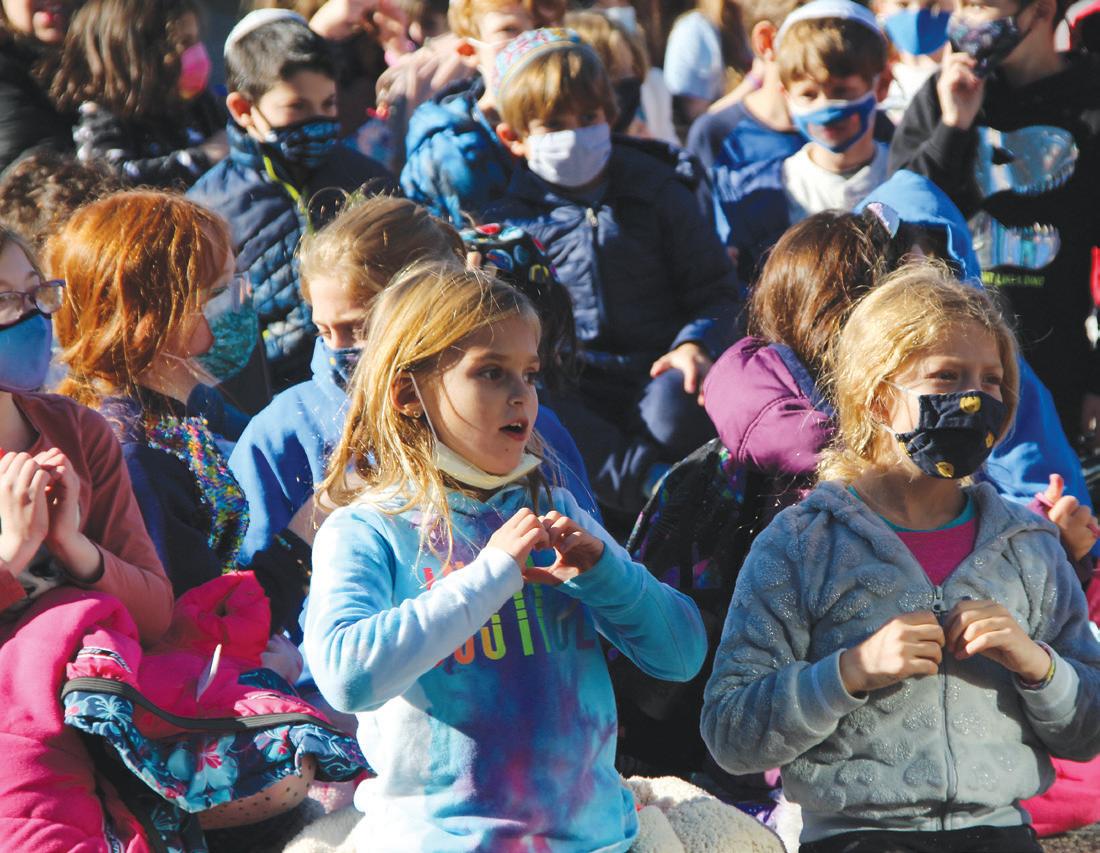

Schechter Students, Adults Share Personal Stories
During a special minyan for Grades 4-8 every Friday morning, an adult or Grade 8 student shared thoughts about a deeply held belief. This speaker series, called “Ani Ma’amin(a)” (“This I Believe”), serves as a critical way to help Schechter students develop their personal identity. This has become a capstone moment for the approximately 20 graduating students who spoke throughout the year. These speakers offer a glimpse into the different perspectives that Schechter Boston has to offer. Watch this year’s speeches on the Schechter website, ssdsboston.org/news.
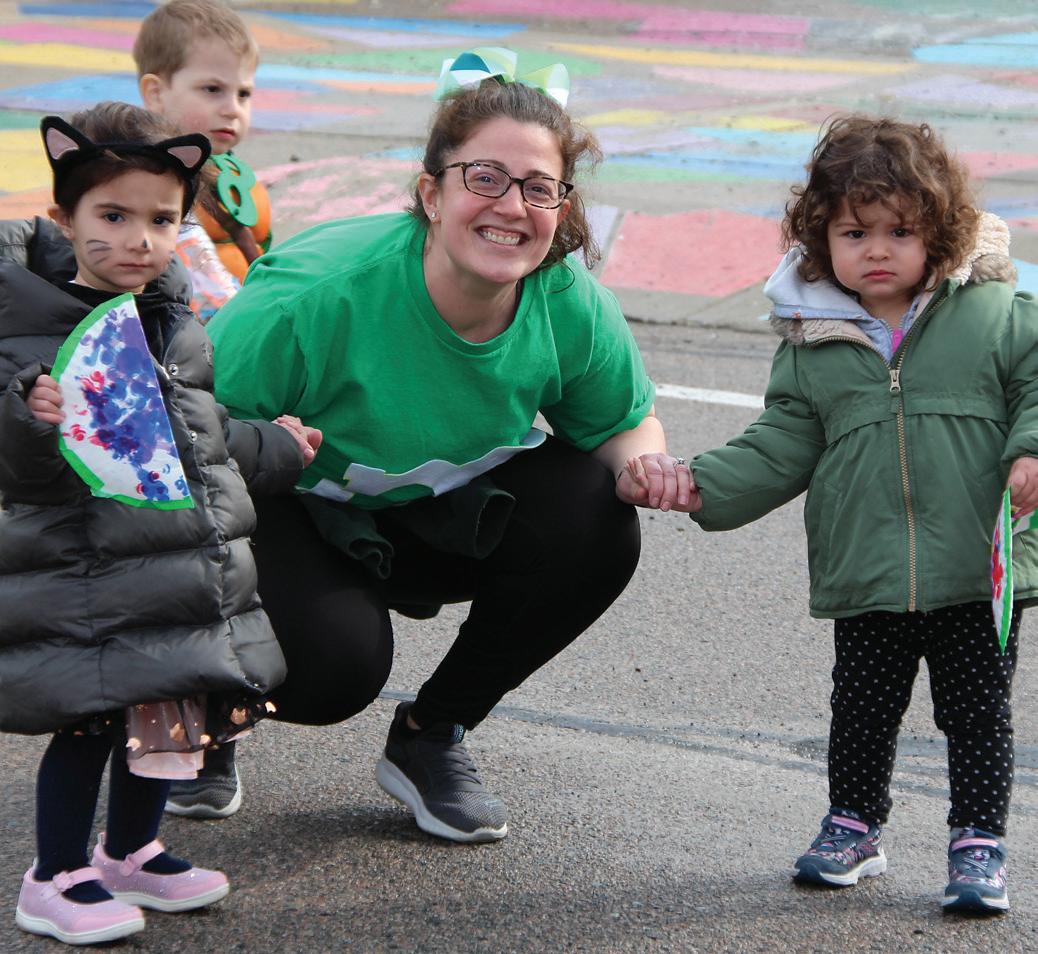
Gan Shelanu Parades!
One of the hallmarks of the year was the Gan Shelanu parades for Thanksgiving, the Lunar New Year, Purim and Yom HaAtzmaut. Students dressed up in holiday-specific clothing and paraded around the Wells Avenue campus.
Students Take Part in Triage Debate
This past November, Dan Savitt’s Grade 7 Jewish Studies classes engaged in a unit focused on the concept of triage. Their essential question was, “What’s at the core of choosing who lives and who dies?” Students spent three weeks studying rabbinic sources and preparing with teams to debate on the following resolution: “The ideal triage system is where patients are treated on a first-come, first-served basis, giving equal consideration to all patients.”

20 Schechter Stories | spring/summer 2022
Hebrew Puppet Show
Fifth-graders in Shoshi Jalfin and Daniela Inbar’s classes presented a puppet show in Hebrew to the fourth-graders. The play was based on Shel Silverstein’s book, The Missing Piece. The students first read the book in class as part of the Hebrew unit, “I Want To Be.” The message conveyed throughout the unit: we are who we are, and we do not have to be perfect in order to be happy.
Grade 8 Holds Mock Trial
After studying the causes of the Civil War, Grade 8 students combined their research and oratory skills to participate in a mock trial of John Brown in January during Social Studies class. Brown was tried for treason and murder for his role in the raid on Harpers Ferry, Virginia (now West Virginia) in 1859. The students used primary sources, consisting of actual witness testimony, to prepare for the mock trial. Members of our faculty served as jurors as each class prosecuted and defended John Brown.
Kindergarteners Built Bridges
Kindergarteners investigated how movable railroad bridges work with STEM Educator Claire Caine. They learned about three different types of movable bridges: a swing bridge, a bascule bridge and a vertical lift bridge. The
students examined how the gears work for each type of bridge and the purpose of the counterweight. They used these lessons to build their own bridges. The finished bridges moved either up and down or side to side.
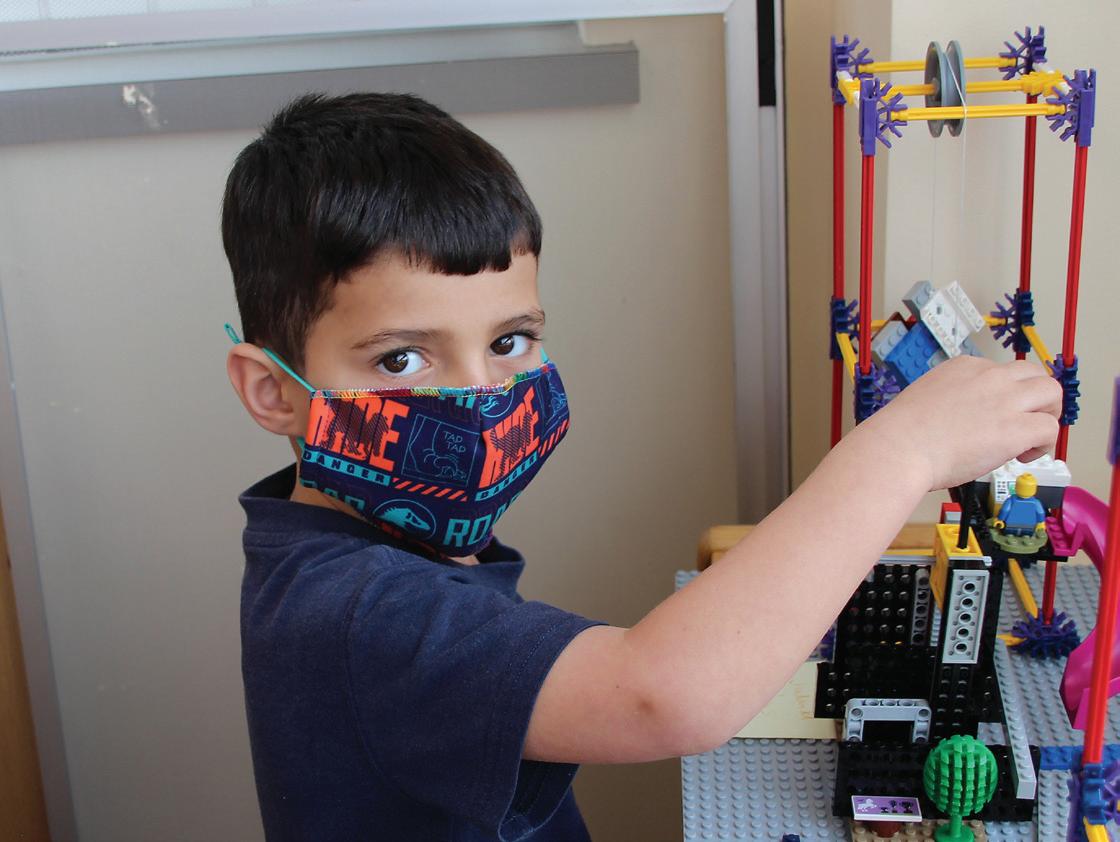

In-Person Milestones Return
Grade 2 kicked off a series of milestone events, when every student had the opportunity to sing together, share another person’s immigration story and showcase their dioramas. This was the first in-person milestone event in two years. The second graders were tasked with interviewing a family member or friend to learn about their immigration to the United States. Some students interviewed grandparents or parents, while others spoke to people they knew. This helped them draw a connection between Avraham and Sarah’s journey, Jewish migration and personal family journeys, which they demonstrated during the milestone event.
spring/summer 2022 | Schechter Stories 21
Grease!
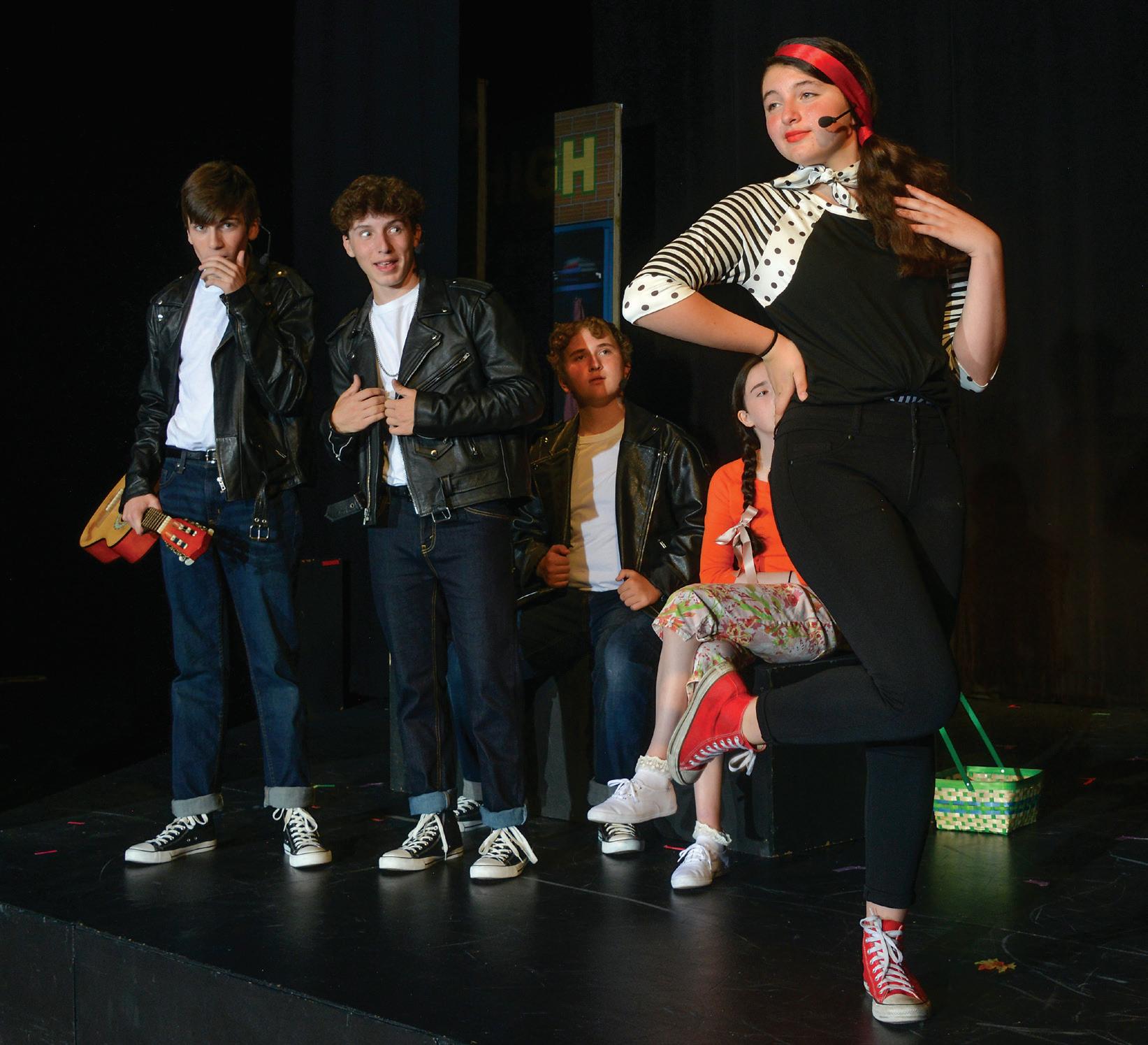
On its surface, Grease is a reminder of the simple joys of youth, dancing and love. But it is also a show that asks us questions about personal change and identity.
—Director ben flaD ’99
Schechter Celebrates 30 Years of All-Hebrew Musicals
A very special Schechter tradition appeared on stage this spring with two showings of Grease, marking 30 years of all-Hebrew productions at Schechter. From “Greased Lightning” to “Hand Jive,” “We Go Together” to “You’re the One That I Want,” the familiar songs and entertaining dialogue made it a night to remember. Kol Hakavod (all the honor!) to the Class of 2022 cast and crew!
22 Schechter Stories | spring/summer 2022

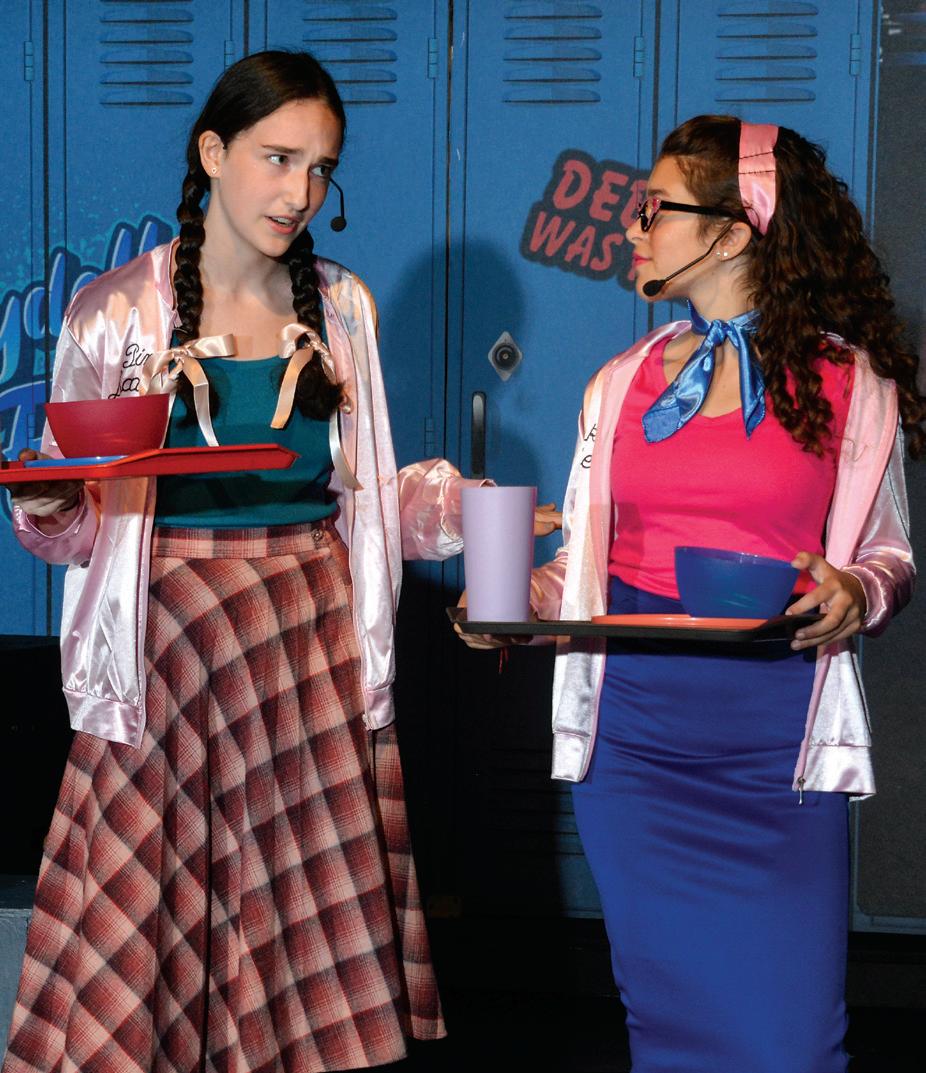

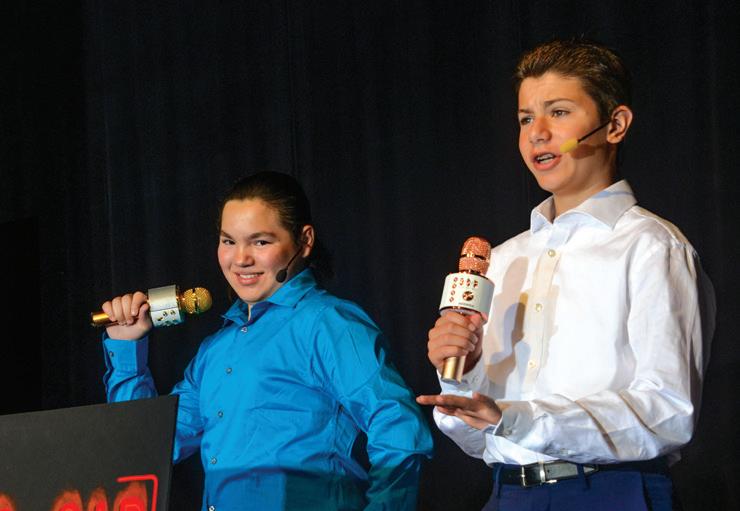
“High school is a challenging time in many people’s lives: trying to discover our own identity while also navigating the socially dangerous world of adolescence,” director Ben Flad ’99 explains. “On its surface, Grease is a reminder of the simple joys of youth, dancing and love. But it is also a show that asks us questions about personal change and identity.”
Maddie Kadden ’22, who plays Sandy, was honored by the opportunity to play such an iconic character.
“Acting in Grease means that I get to explore new roles and opportunities for myself,” Maddie says. “I have never had a role quite like Sandy, and I am able to really grow as an actor in a part that I am not as used to.
Grease is also just a fun show, and I am really able to enjoy rehearsals and just have fun with it.”
“I’ve always wanted to be in a play, and I haven’t really had that opportunity yet,” Avery Judd ’22, who plays Mikey, adds. “I feel like it’s a good bonding experience.”
spring/summer 2022 | Schechter Stories 23
Honoring Shoshi Jalfin
At the close of the 2021-2022 school year, we honor and celebrate our colleague, Shoshi Jalfin, as she retires from Schechter after an incredible tenure of 34 years. Through her love of Tanach, tefillot, Jewish studies and Hebrew, she leaves an indelible mark on her students. Shoshi started in September 1988. Over the years, she has taught third, fourth and fifth grade. Her three children all graduated from Schechter.
“While I have been a teacher for so many years, I have also been extremely lucky to have learned so much throughout my time at Schechter,” she says. “Every single day, this school has offered me the opportunity to learn and to grow both professionally and as an individual.”
Director of Jewish Life and Learning Rabbi Ravid Tilles reflects on Shoshi’s contribution to the Schechter community. “She has served as a mentor to almost every one of the Hebrew and Jewish Studies teachers during her time at Schechter. I can think off the top of my head of 10 teachers who have been deeply influenced and inspired by Shoshi.”
Outside of Schechter, Shoshi has continued her learning. Since moving to the United States, she has earned a Bachelor’s of Education Degree in Judaic Studies from Hebrew College, a Master’s of Education Degree from Wheelock College and, just in the last few years, a Certificate of Advanced Graduate Study in teacher leadership from Brandeis University.
“I have learned from my peers, teachers and colleagues, those who came before and after me. I have learned from the many teachers I have coached and mentored along the way. Above all, I have learned from my students,”
she says. “They have taught me to laugh, to be patient and considerate; and they have taught me to perceive teaching Hebrew and Jewish studies as my mission as an educator.”
In a full-circle moment, Shoshi’s former student, Lindsay Flammey ’07, is now her colleague as a Grades 4-5 Jewish Studies teacher.
Shoshi has been an incredible teacher, mentor, colleague and friend... She has set the standard for what Jewish learning looks like at Schechter.
lindsay flammey ’07, grades 4-5 Jewish s tudies teacher
“Shoshi has been an incredible teacher, mentor, colleague and friend. From being my fourth-grade Hebrew teacher to coaching me through my first year of teaching, Shoshi has never wavered in her dedication to her students,” Lindsay says. “I have been uniquely blessed to be able to continue to learn from Shoshi, beyond what I learned from being her student: I have learned what it means to infuse my teaching practice with passion for the material and my students. Shoshi has set the standard for what Jewish learning looks like at Schechter, and we have all been lucky to have had her for so many years.”
Looking back on her career, Shoshi shares that “when you do something you love, it doesn’t matter how many years you’re doing it because you’re doing something you’re passionate about.
24 Schechter Stories | spring/summer 2022
She always made everything fun, whether it was puppet shows or projects. Fifth-grade Hebrew was one of my favorite classes, and Shoshi always made me feel like I belonged.
—liZ a scott ’23

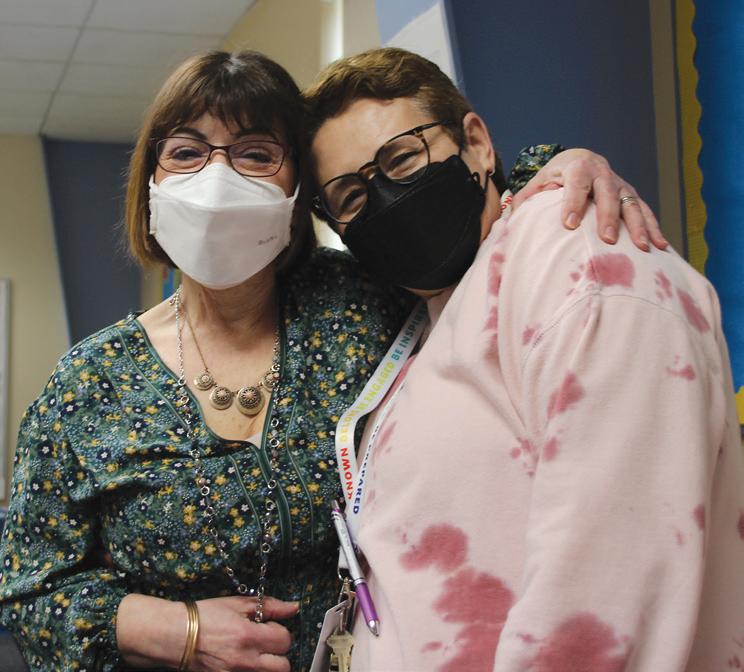

I learned from Shoshi that, even in our darkest moments, if we have the tiniest spark of light, it makes all the difference.
—sarah singer ’23

Shoshi always had a smile and was always up for having a good time.
—leah Zur ’24


She was a wonderful teacher and taught me so much. She pushed me to learn more Hebrew and to be more confident in my Hebrew skills. She really is an amazing teacher, and I’m sad to see her go.
—m aia leibler-tolea ’24
The thing that I loved most about my time with Shoshi was playing all of the games that we played and the work that we did in groups.
—ilan sPerber ’25
spring/summer 2022 | Schechter Stories 25
Show Your Spirit!
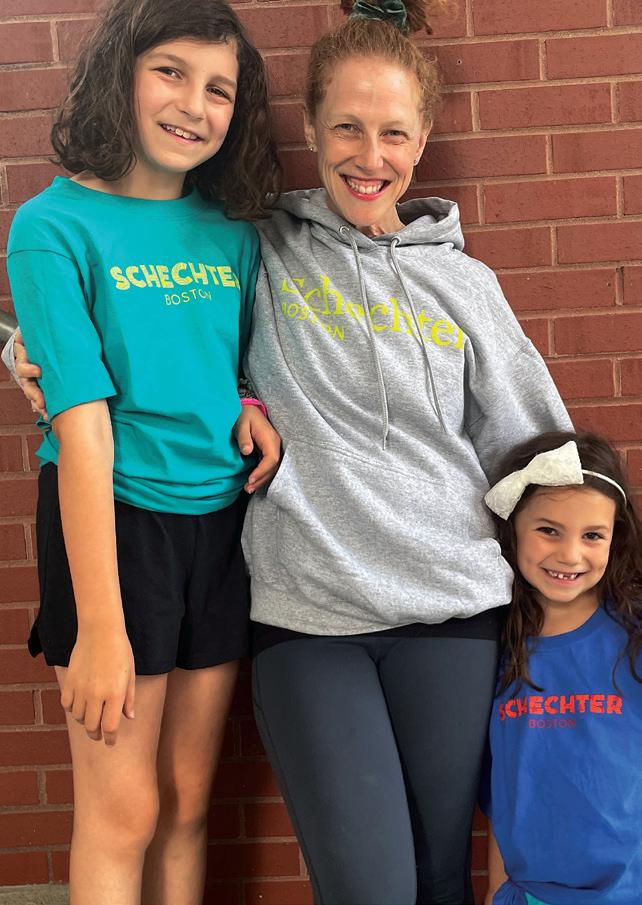


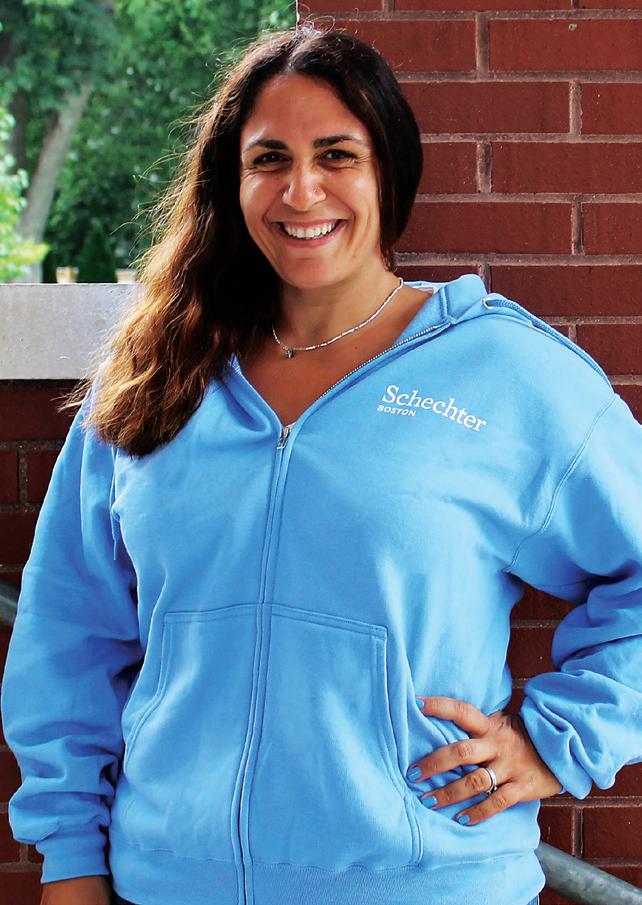
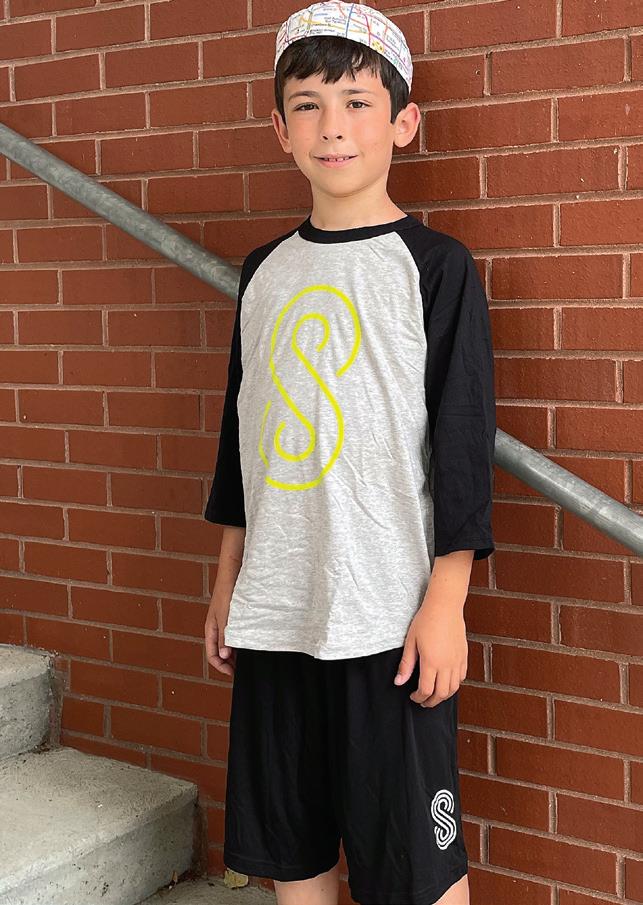

26 Schechter Stories | spring/summer 2022
SSDSBOSTON.ORG/SPIRIT
By Stephanie Fine Maroun
This past spring, the entire eighth grade, along with six chaperones, participated in the extraordinary Israel Study Tour. The twoweek trip was jam-packed with nonstop sightseeing, piping hot pita pockets with falafel and tahini (of course!), hands-on activities and the opportunity to be part of three of Israel’s most important, modern holidays:
Yom HaShoah, Yom HaZikaron and Yom HaAtzmaut. Whether the students were hiking Mount Arbel, praying at the Kotel on Shabbat or poking around the Carmel Shuk, they were immersed in the incredible breadth of Biblical and modernday Israel.
Led by Grade 8 Hebrew Teacher and Israel Study Coordinator Yakov Dov, the trip brought Israel to life for the students as they now stood upon the very places that they had studied at Schechter. The students climbed Masada at dawn, reaching the top by sunrise. They found themselves walking through Hezekial’s Tunnel beneath the streets of Jerusalem. Along with the unique beauty of being at
the Kotel for Shabbat, students returned again during the day to wedge scores of the tiny folded notes from younger classmates into the cracks between the rocks and then descend to the subterranean portion of the wall for a guided tour.
A stop at the Palmach Museum enhanced students’ understanding of Israel’s birth, which was coupled with the immense power of being there in person for the one-minute nationwide siren on Yom HaZikaron after which the class sang Hatikvah. The joyous celebrations on Yom HaAtzmaut and a dance cruise on the Kinneret showed the eighthgraders firsthand the exuberance of life in Israel. As always, the schedule included a service project, on this occasion with the International Fellowship of Christains and Jews, during which students packed food for at-risk and needy populations.
Whether talking to peers at Reali High School, Schechter’s sister school in Haifa, reading street signs or ordering food, students flexed their Hebrew skills every day. As our oldest students now prepare to graduate, this capstone experience represents the powerful and emotional moment when the core of their Schechter experience has been realized so memorably. From Rosh HaNikra to the Negev, the beach in Tel Aviv to a Bedouin tent, the trip opened students up to deeper, more passionate connections to Hebrew, to the stories of the Torah, people with familiar and different customs, to ancient and bustling cities, all of which, simply put, is Israel.
Israel Comes Alive


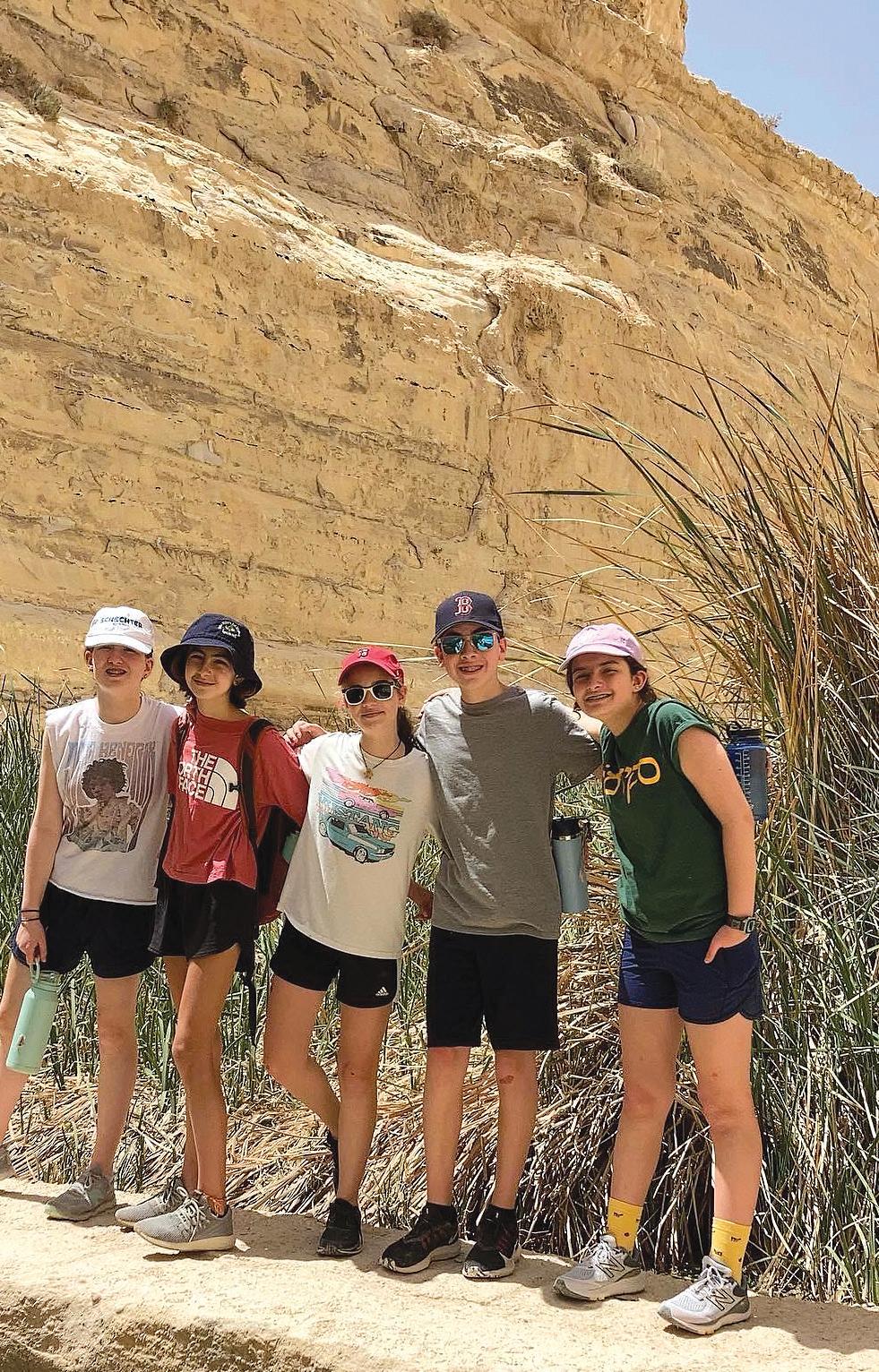
spring/summer 2022 | Schechter Stories 27
Dr. Jessica Gray ’96
Jessica is a family medicine physician and addiction medicine specialist at Massachusetts General Hospital. She received her B.A. from Stanford University and her M.D. from the Boston University School of Medicine. She did her residency training and completed an addiction medicine fellowship at Boston Medical Center.
Jessica’s two sons, Max and Eli, both currently attend Schechter as did her husband, Ari Sussman ’92.
There’s nothing like the bond you create with close childhood friends. From Bar Mitzvahs to the Washington, D.C. trip to the Schechter play, Schechter created a platform for shared experiences. Those bonds were strong enough that many of them held through college and into my adult life. We are now raising kids together and in some cases sending our kids to Schechter together, which is just so special.
This award was established in 2014 in honor of former Head of School Arnold Zar-Kessler. It is presented to a Schechter alumnus or alumna each year who embodies Schechter’s values in his or her professional, academic and volunteer roles in his or her community. This year, we are thrilled to announce Dr. Jessica Gray ’96 as the recipient of this honor.
28 Schechter Stories | spring/summer 2022
Arnold Zar-Kessler Award

Reflecting on her role as an alumna who has returned to Schechter as a current parent, Jessica values the opportunity to both create new relationships and to have continuous relationships with the people she knew 30 years ago.
In her “Ani Ma’amina” (“This I Believe”) presentation with our students, she shared a list of five guiding principles:
Stay connected
The opposite of addiction is connection, so keep building your community at Schechter.
Be curious and not judgemental
You’d be surprised at what you learn by hearing others’ perspectives.
Show up
You, as an individual, can’t fix everything that’s going on in the world, but you can show up for your family, for your friends and for the broader community, and that’s really enough.
Be grateful
Gratitude is the key to life. Find small ways to acknowledge what others have done for you
Help others
Remember, helping others can give you more than you give them.
To watch the full video, visit ssdsboston.org/ outstandingalumni
spring/summer 2022 | Schechter Stories 29
Class Notes
1984
Amie (Kaye) Gilbert is back home in Massachusetts after 23 years in Colorado. She is currently teaching second grade on the Cape. She remarks that it’s wonderful to experience things like amazing seafood and fall foliage again as well as being surrounded by the natural beauty of Cape Cod.
1991
Mazal Tov to Lee Eisenberg and his wife, Emily, on the birth of their daughter, June Rose.
1995
Ayelet Amittay is a psychiatric nurse practitioner who works in a private practice, focusing on perinatal mental health. She also had poems published recently in the Jewish Literary Journal and on the American Jewish Historical Society website.
Max Davis is the rabbi at Congregation Darchei Noam of Minneapolis, where he has been living with his family for the past six years.

Mazal tov to Ariele Farber Poleg and Oren Poleg on the birth of their daughter, Aviv Shai Poleg, in April 2021. Ariele also founded a communications consultancy in 2020, www. evergreeneditorial.com.
Mazal tov to Naomi Hausman Shoihat and Boris Shoihat on the birth of their son, Adam Shalev Shoihat, in June 2021. Naomi is an economics professor in the business school at Hebrew University.
1996
Amit Paley made Fortune’s 40 under 40 list for his work at The Trevor Project. Amit is the chief executive officer and executive director of The Trevor Project, the world’s largest suicide prevention and crisis intervention organization for LGBTQ young people.
Hayley (Manin) Mitman is now a Schechter parent and loves how incredible it is to see the experience and love of Judaism through the eyes of the next generation.
1997

Mazal Tov to Aliza Hochman Bloom and Chaim Bloom on the birth of their daughter, Eve Daniela Hochman Bloom.
1998
Mazal tov to Carmel Dibner and Daniel Mazor on the birth of their son, Nadav.
Talia Liben Yarmush won a Simon Rockower Award for Excellence in Jewish Journalism in the category of personal essay. She took second place for an essay in Hadassah Magazine for her article, “The Blessings and Trauma of IVF.” Talia has recently started a new role as the social media manager at the American Committee for the Weizmann Institute of Science.
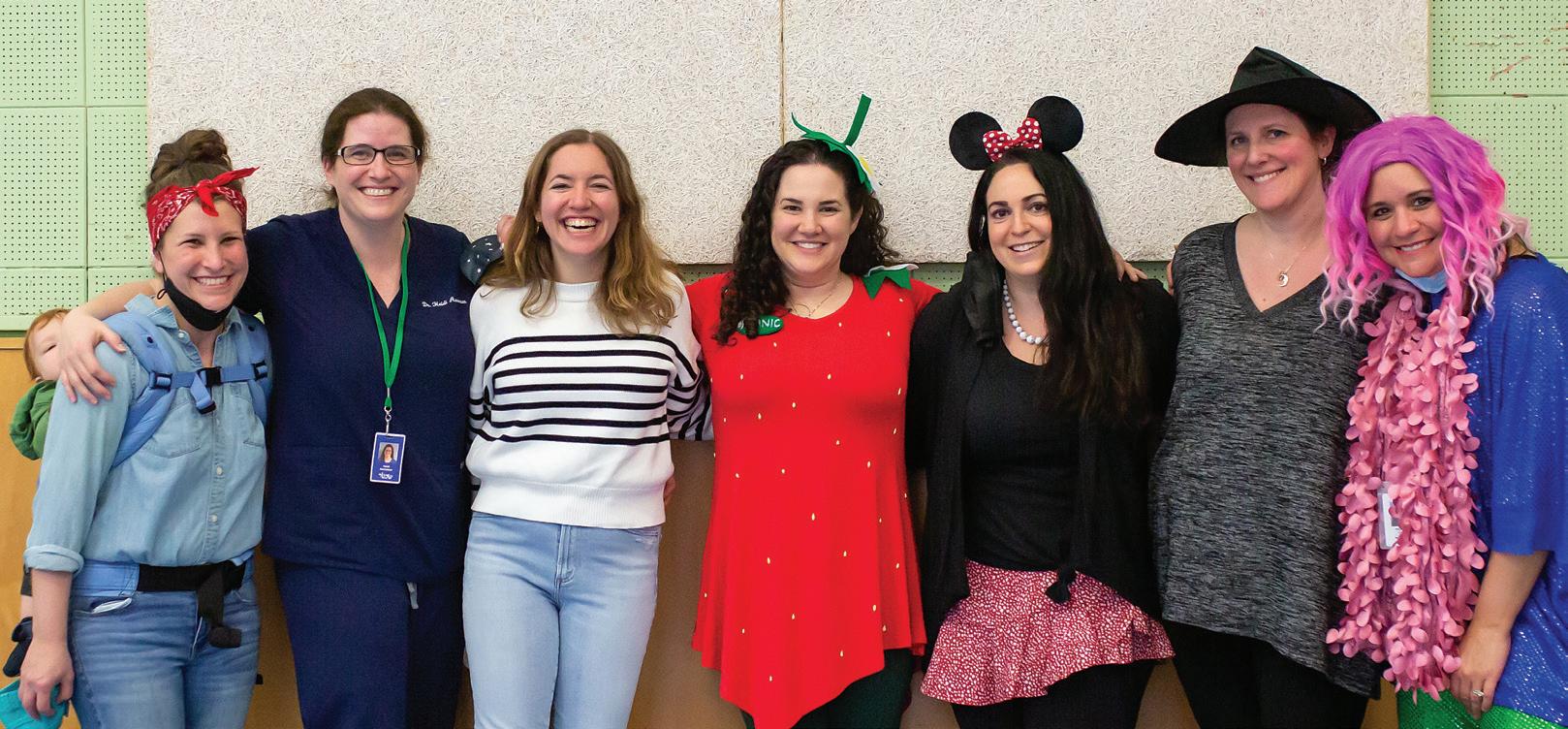
30 Schechter Stories | spring/summer 2022
eve bloom
a grouP of schechter alumnae reunited at this year’s stein circle Purim carnival: (left to right), eRIka (DavIS) toRbeRt ’97, HeIDI (bIRNbaum) a aRoNSoN ’96, RacHel (cHIel) k atz ’97, Haley (maNIN) mItmaN ’96, eRIca (SaNIeoff) beRmaN ’97, JeN ScHockett ’91 and head of school Rebecca (cole) luRIe ’93.
max davis
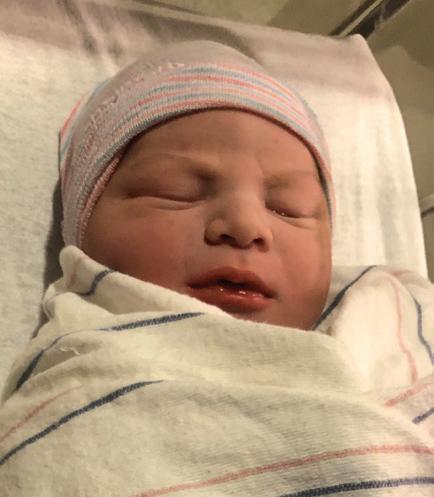

Mazal tov to Joseph Simons and his wife, Doreen, on the birth of their son, Lev Abraham Simons.
1999
Mazal Tov to Ben Flad and Cassie BudgeFlad on the birth of their daughter, Zahava. Ben is currently working at Schechter in an early childhood classroom and directed the Grade 8 all-Hebrew musical, Grease
Mazal Tov to Ronna (Krell) Ungar, Brian Ungar and big sister Bonnie on the birth of their daughter and sister, Eden Brielle Ungar.
Mazal Tov to Jeremy Micley and Anna Norregaard on the birth of their son, Leo Svend.
2000
Mazal Tov to Becca Leffell Koren and Raphael Koren on the birth of their son, Noah Max Koren.
Mazal Tov to Jamie (Chiel) Sturm and Yair Sturm on the birth of their daughter, Avigayil Breundel. Big siblings Sammy and Liana are thrilled!
Mazal tov to David Zeman and Amy Zeman on the birth of their daughter, Frida Tal.
Mazal tov to Gail Fogel and David Leitman on their marriage in August 2021. Gail and David got engaged and then married at the same farm in Winchester, Massachusetts, taking their first steps among raspberry bushes and wildflowers. Many Schechter alumni were in attendance.
2001
Molly Cohen recently moved back to the Boston area with her husband, Baishi, and their two children, Mirah and Jodie.
Elana Jacobs and her husband, Nathan Brown, marched with their son, Franklin Moshe Brown (now two years old), and baby daughter, Netta Sylvia Brown, at Netta’s first Mardi Gras since Netta’s birth last July in New Orleans. Elana runs a Pilates studio, the Subtle Grand, and continues to be the artistic director for her performance company, CabinFever.
Mazal tov to Andrew Pankin on his marriage to Shannon Fitzgerald in June 2021 after having postponed their wedding many times due to COVID-19. They are presently living in Newton and welcomed their first child, Judah Joseph Fitzgerald Pankin, in May. Andrew is the director of sales operations at BetterLesson, an ed tech startup company located in Cambridge. Shannon is a pediatrician with a specialty in adolescent medicine at Children’s Hospital in Boston.
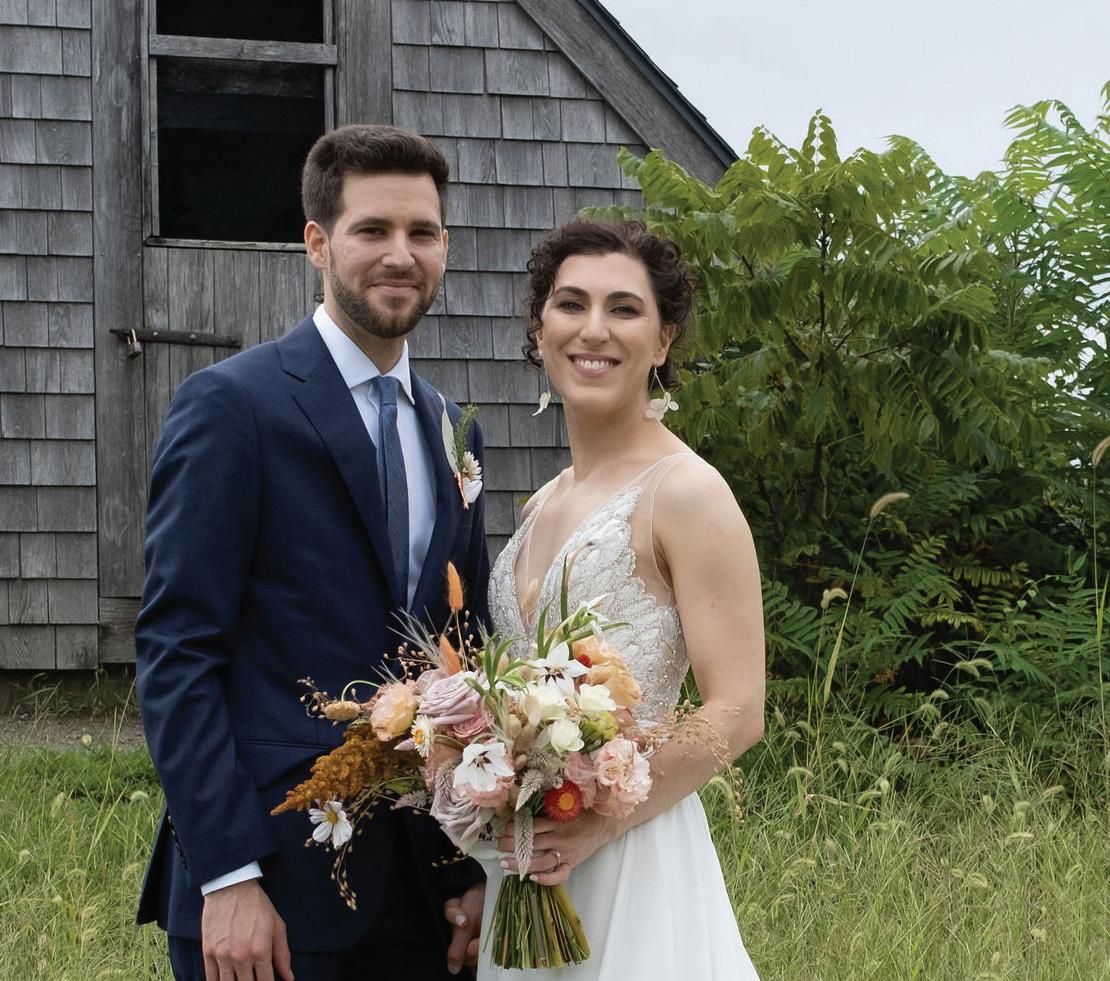
Sara (Manning) Peskin published A Molecule Away from Madness: Tales of the Hijacked Brain, a book about patients with diseases of the mind and the scientists who are working to cure them.
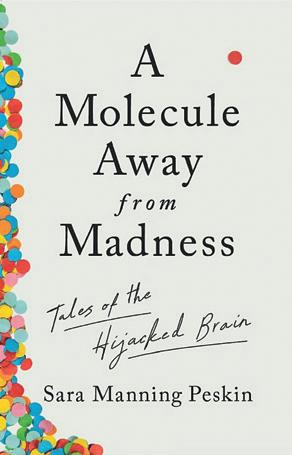
Mazal Tov to Adina (Remz) Tenby and Josh Tenby on the birth of their daughter, Maisie, little sister to Ella.
2002
Shana Simkin is a clinical instructor at MedStar Georgetown University Hospital in the Department of Psychiatry.
Mazal tov to Jessica Leifer and Steven Rotchtin on the birth of Zoe Leah Rotchtin on November 24, 2020, and to brother Sam Rotchin (3) on becoming a big brother.
2003
Mazal tov to Naomi Forman on her engagement to Alex Steinberg.
Continued on next page
spring/summer 2022 | Schechter Stories 31
nadav maZor eden and bonnie ungar
gail fogel and david leitman
Class Notes
Mazal tov to Daniel Wolf and Mimi Lewis on the birth of their daughter, Nava Ruth Wolf, on February 4, 2022, on the first birthday of her cousin, Razie (daughter of Alanna Wolf ’06 and Herschel Singer).
2004
Mazal Tov to Josh Micley and his wife, Alexa, on the birth of their son, Elan.
Joshua Pankin is married to Ruthie Wyshogrod and is currently pursuing a medical degree at Tel Aviv University. They will be moving back to the U.S. this year and, Ruthie will be pursuing a Master’s Degree in social work while their dog, Tenzing, takes on the new challenge of his Ph.D. in “barcheology.”
2005
Mazal Tov to Sara Miriam Liben on her new role as director at the Nativ College Leadership Program.
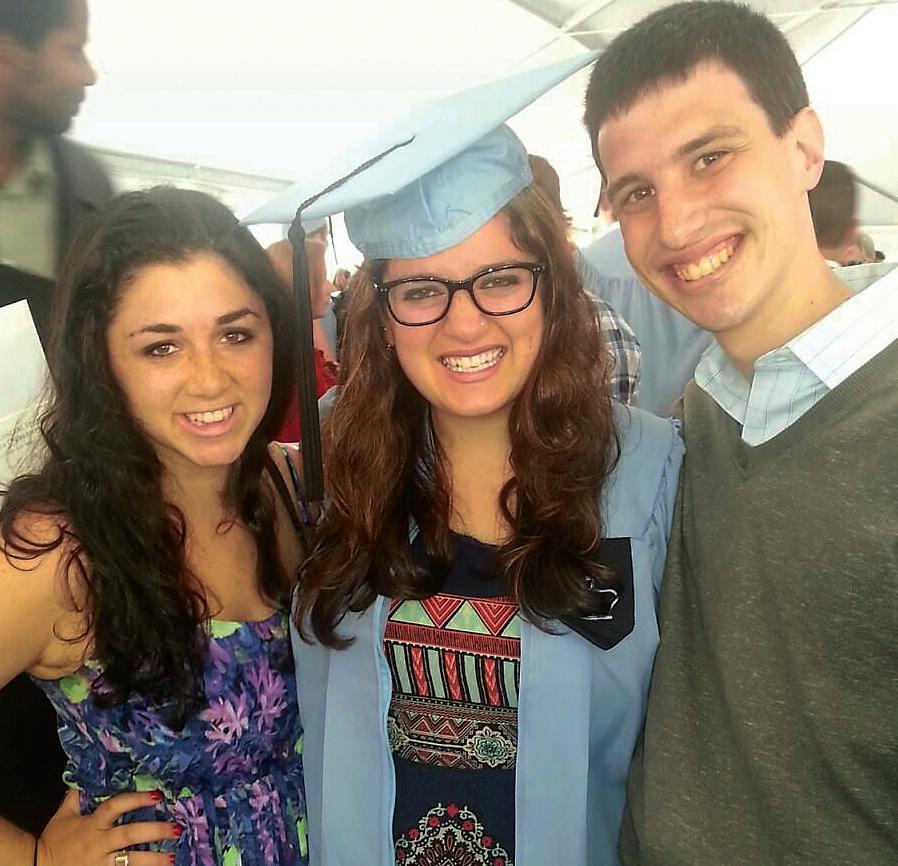
2006
Mazal tov to Bradley Baskir and his wife, Aliza, on the birth of their daughter, Abigail Lily, in December 2020. Bradley also started a new job as a financial advisor at Morgan Stanley in July 2020.
2007
Mazal Tov to Ben Leifer on his engagement to Miriam Zawadzki.
Benjamin Pankin works at Capital One in Washington, D.C. He recently completed a Master’s Degree in data analytics at Georgia Tech. He is living in D.C. with his girlfriend, Mollie Frazier. Mollie is a senior federal project manager at Cerner Corporation.
Mazal tov to Eitan Kling-Levine on his engagement to Spencer Glass. Eitan is currently a group account supervisor at Havas Life New York, managing the U.S. distribution communications for one of the major COVID-19 vaccines. Spencer is a theatre consultant, coach and middle school theatre educator. They both love living in Manhattan.
2009
Sarah Schneider joined the staff of Mayyim Hayyim: Living Waters Community Mikveh in an administrative role.
2010
Mazal tov to Wyatt Mufson and Alisa Feldman on their engagement (another Schechter marriage.)!
Mazal tov to Emily Farbman and Zak Kadish on their engagement!

2012
Veronica Leifer graduated from Barnard College of Columbia University in April 2021 and is now working for Zoc Doc in New York City as a customer success manager. Veronica is also a resident of the Murray Hill Moishe House in New York.
Hillel Maroun and Yael Sternberg rounded the corner and bumped into each in New York City on the Lower East Side last fall.
2014
This past summer, Elliot Kann worked for Astranis, a satellite internet company based in San Francisco, on their satellite assembly team.
Hadas Maroun graduated from the University of Vermont with a B.A. in psychological sciences, a minor in religion and a certification in the promotion of physical activity in youth and children. She was on the Dean’s List and was named the co-recipient of the George W. Albee Award. This fall, Hadas will be at Lesley University beginning a Master’s Degree in clinical mental health counseling. She is the recipient of a Lesley University Faculty Scholarship award and plans to ultimately pursue a Ph.D. in psychology.
2017
Rebecca Geisberg is doing a gap year program in Israel. She is living in Tel Aviv and has an internship at a tech company.
Are you interested in Schechter’s alumni work and engagement?
We are always looking for Schechter alumni to assist with class reunions, events, class engagement or the Alumni Committee. Please email alumni@ ssdsboston.org to learn more about opportunities or with any questions.
32 Schechter Stories | spring/summer 2022
talia klein, sara miriam liben and david offit, who have stayed friends since kindergarten, gathered at sara miriam’s graduation from columbia and the Jewish theological seminary.
hillel maroun and yael sternberg
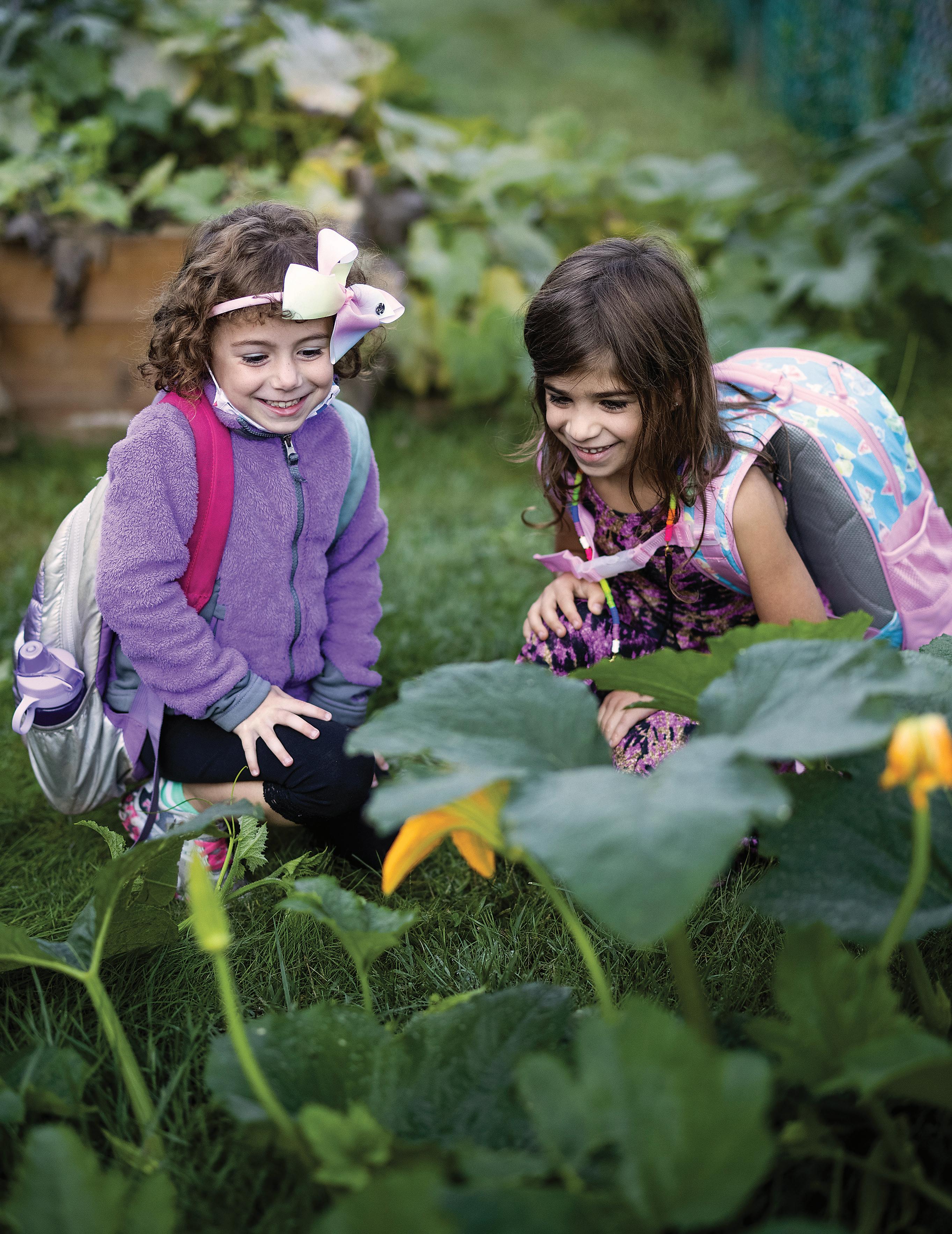

125 Wells Avenue Newton, MA 02459 617-928-9100 ssdsboston.org Visit us online at ssdsboston.org






 Rebecca Lurie, Head of School
Rebecca Lurie, Head of School







































































